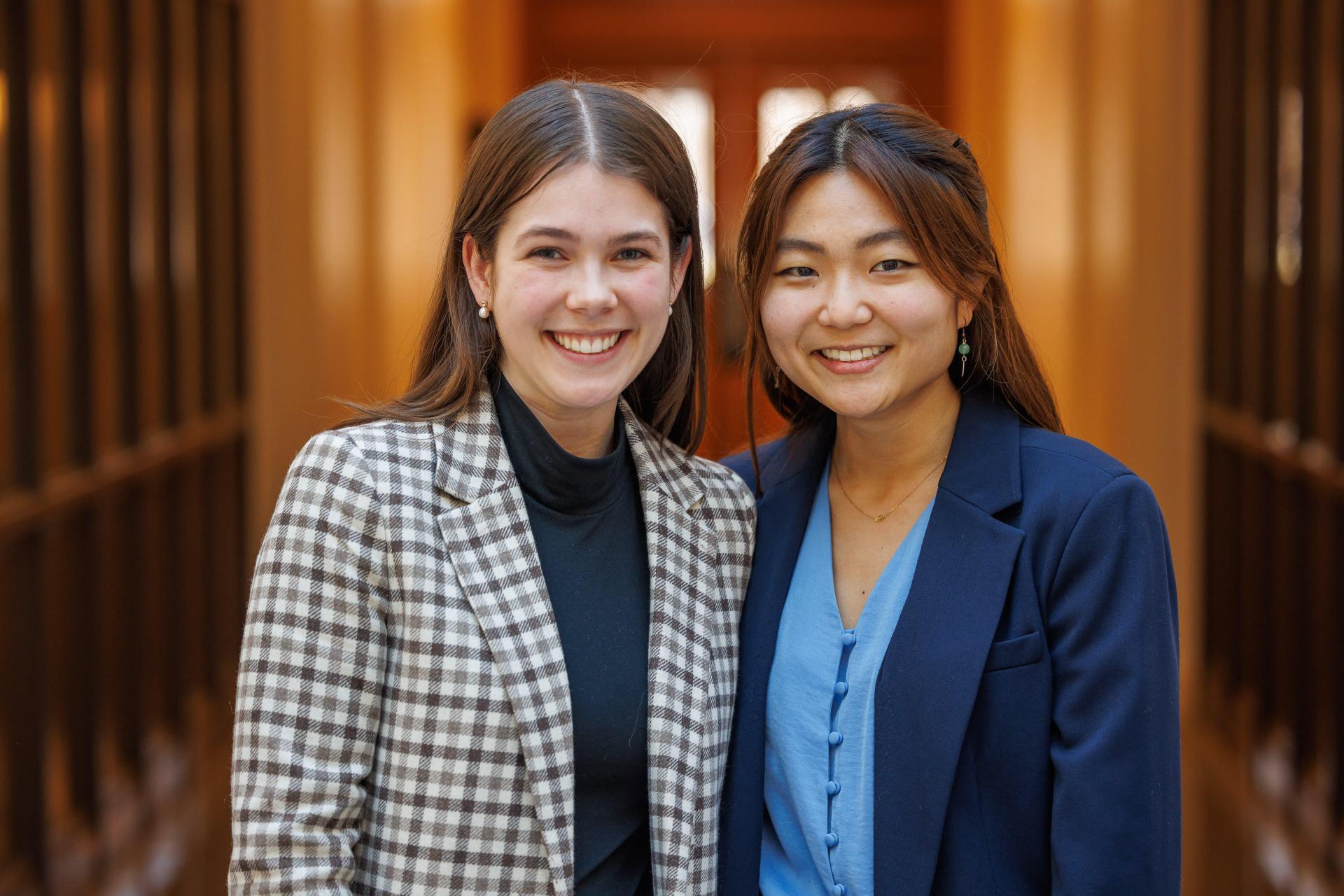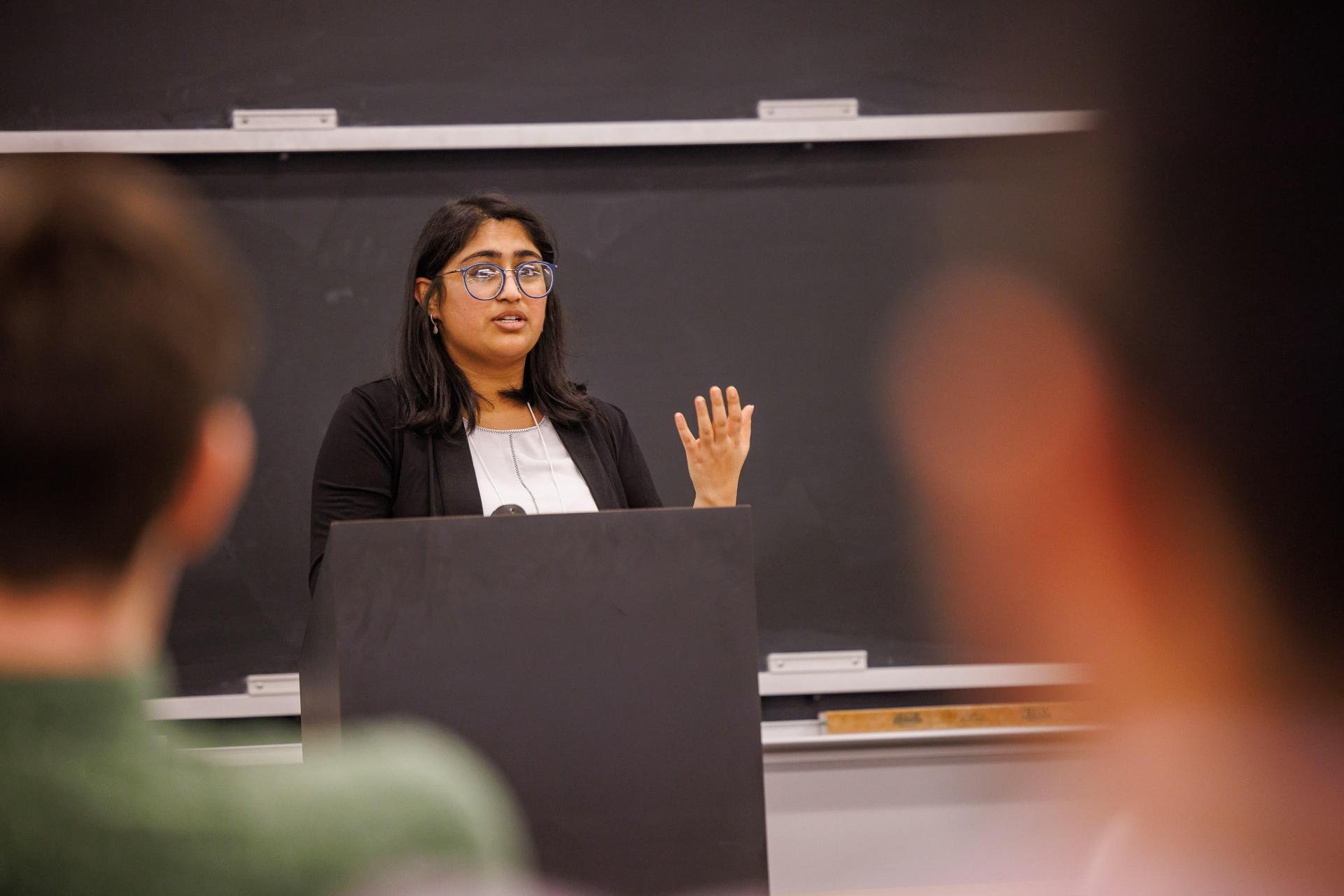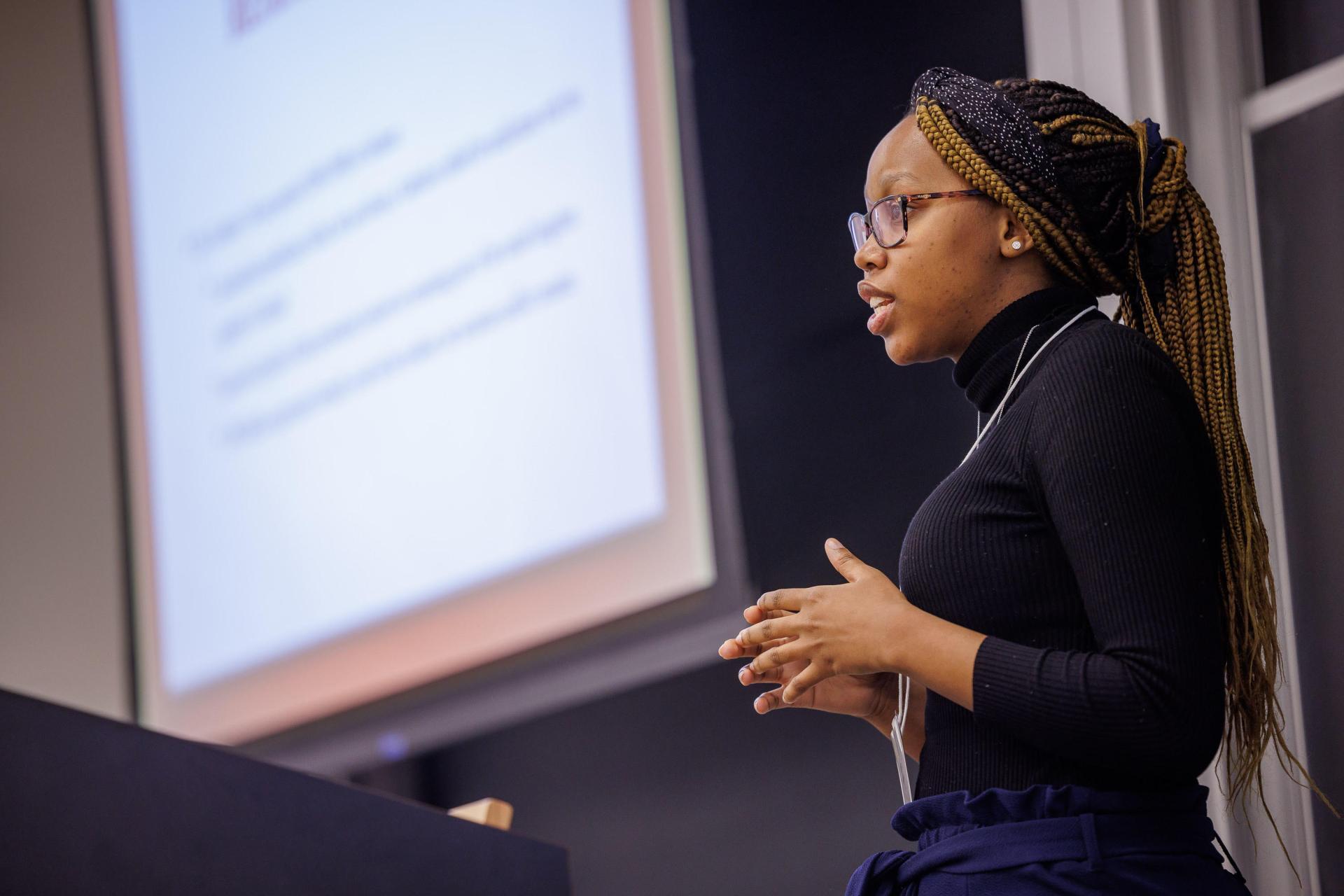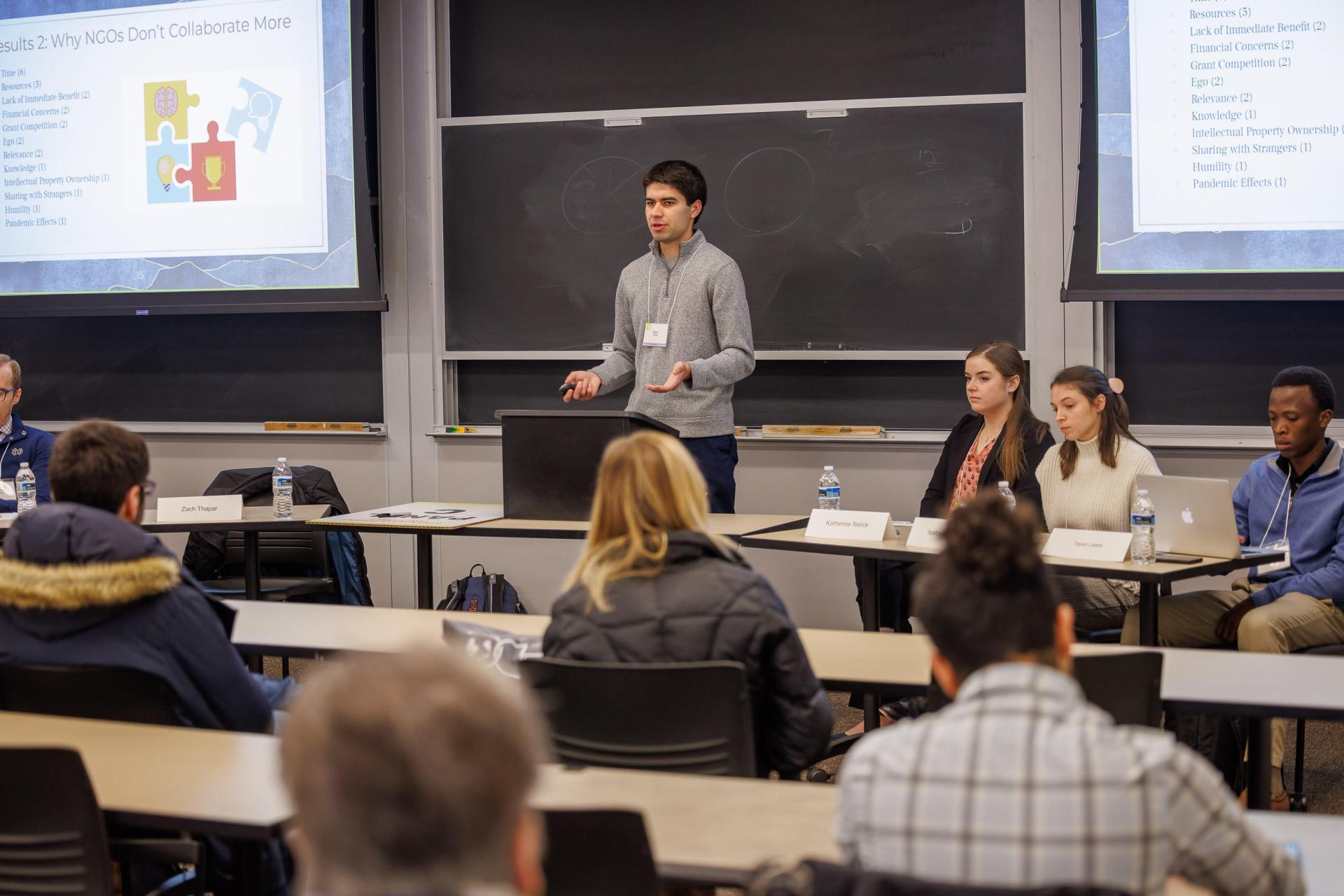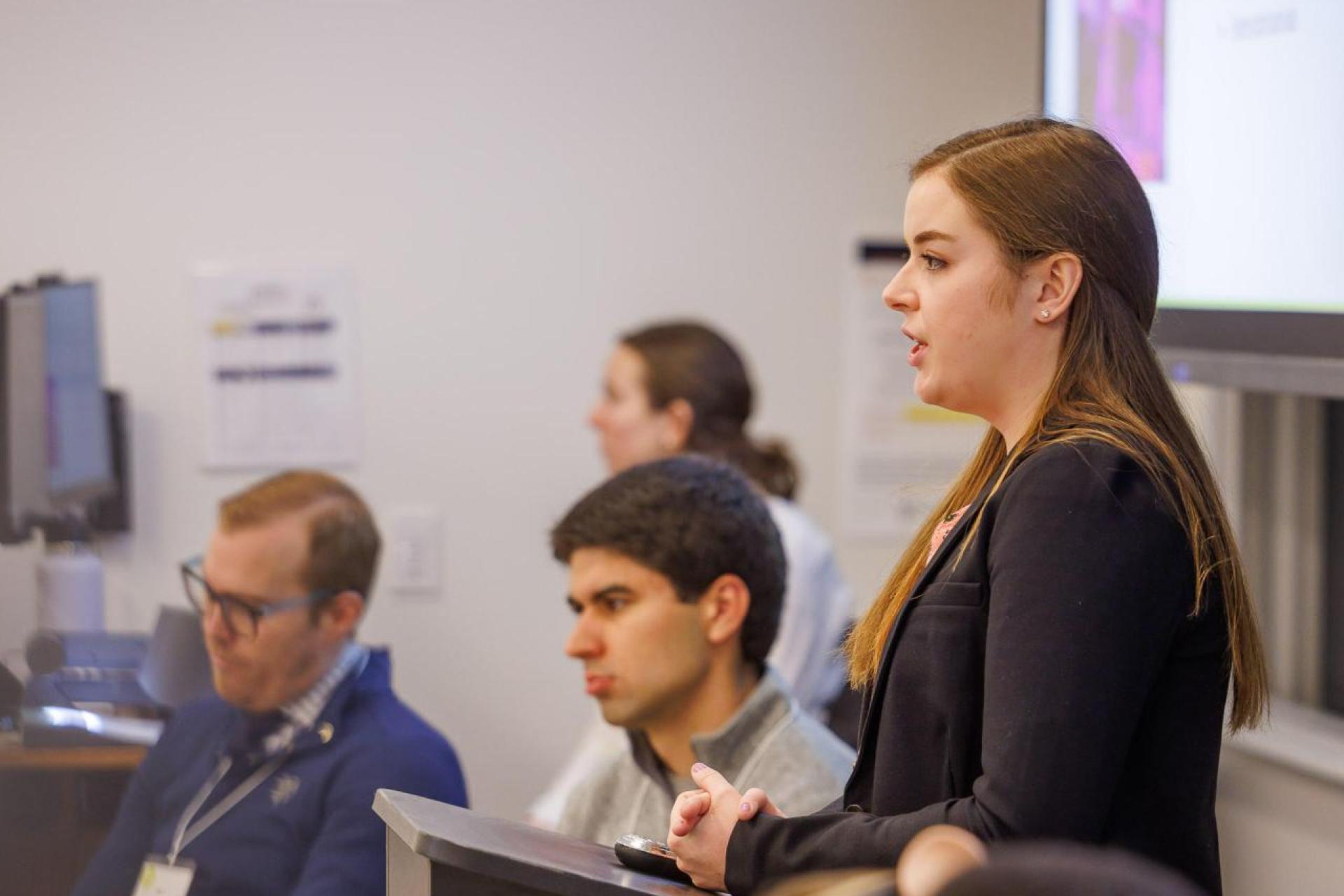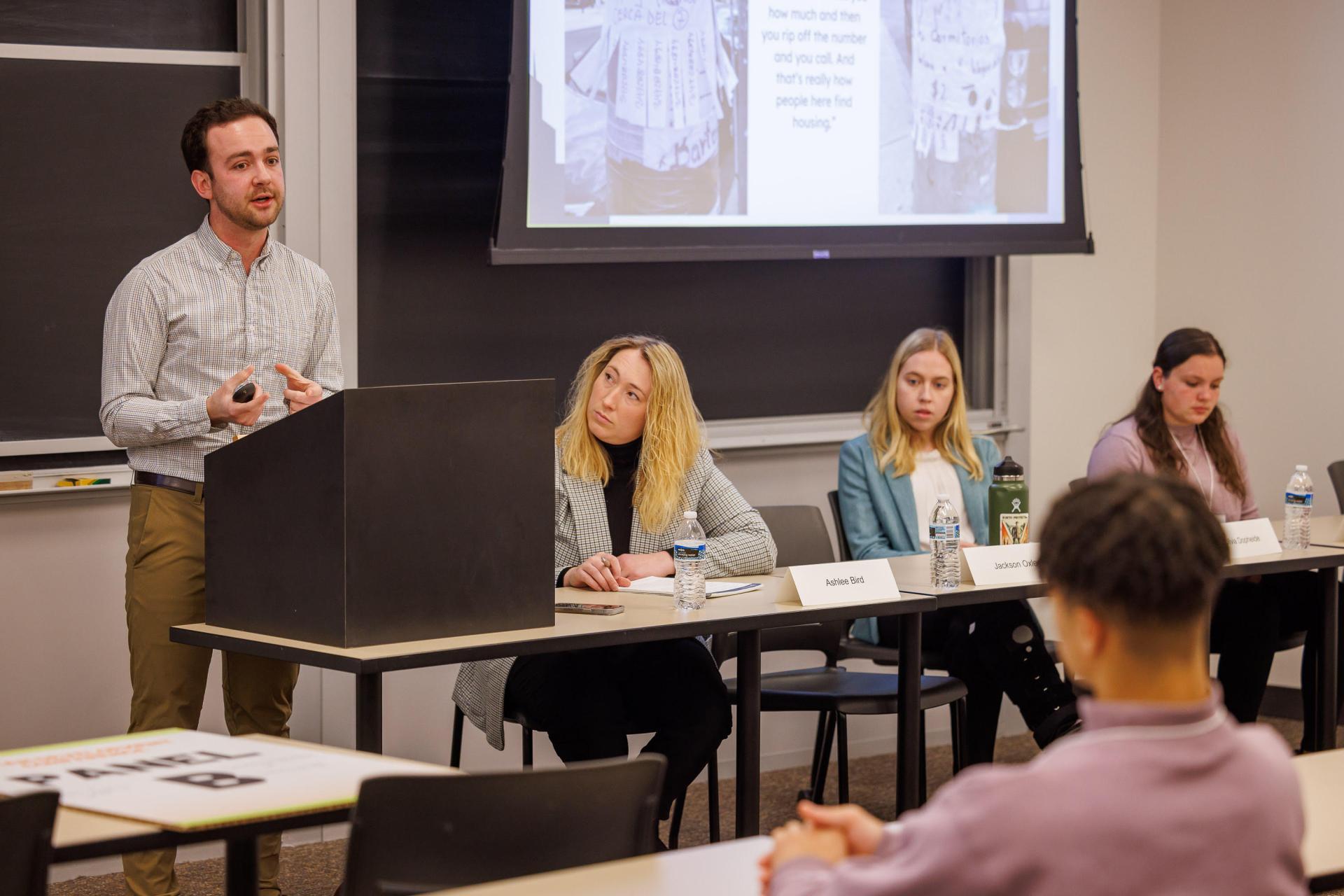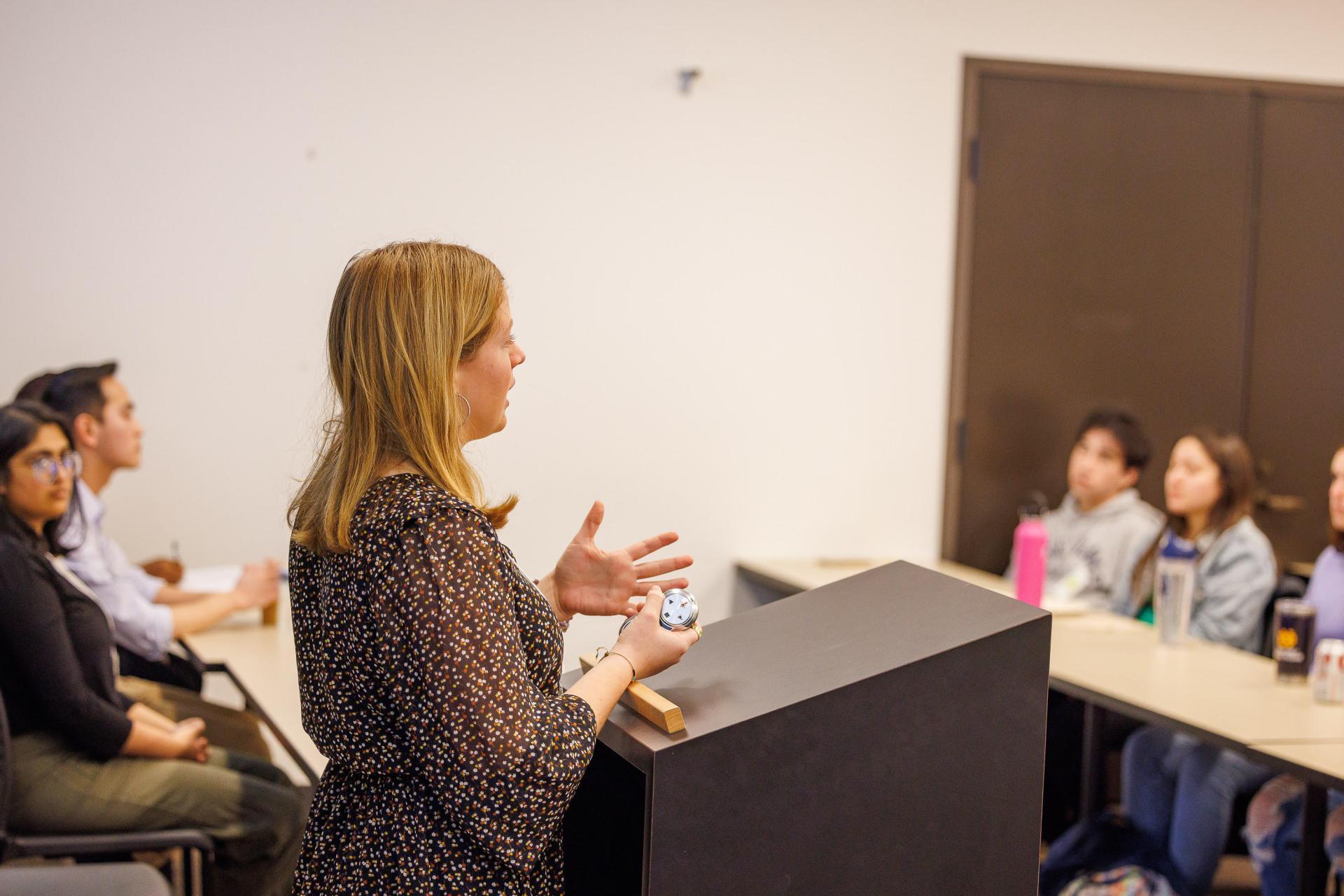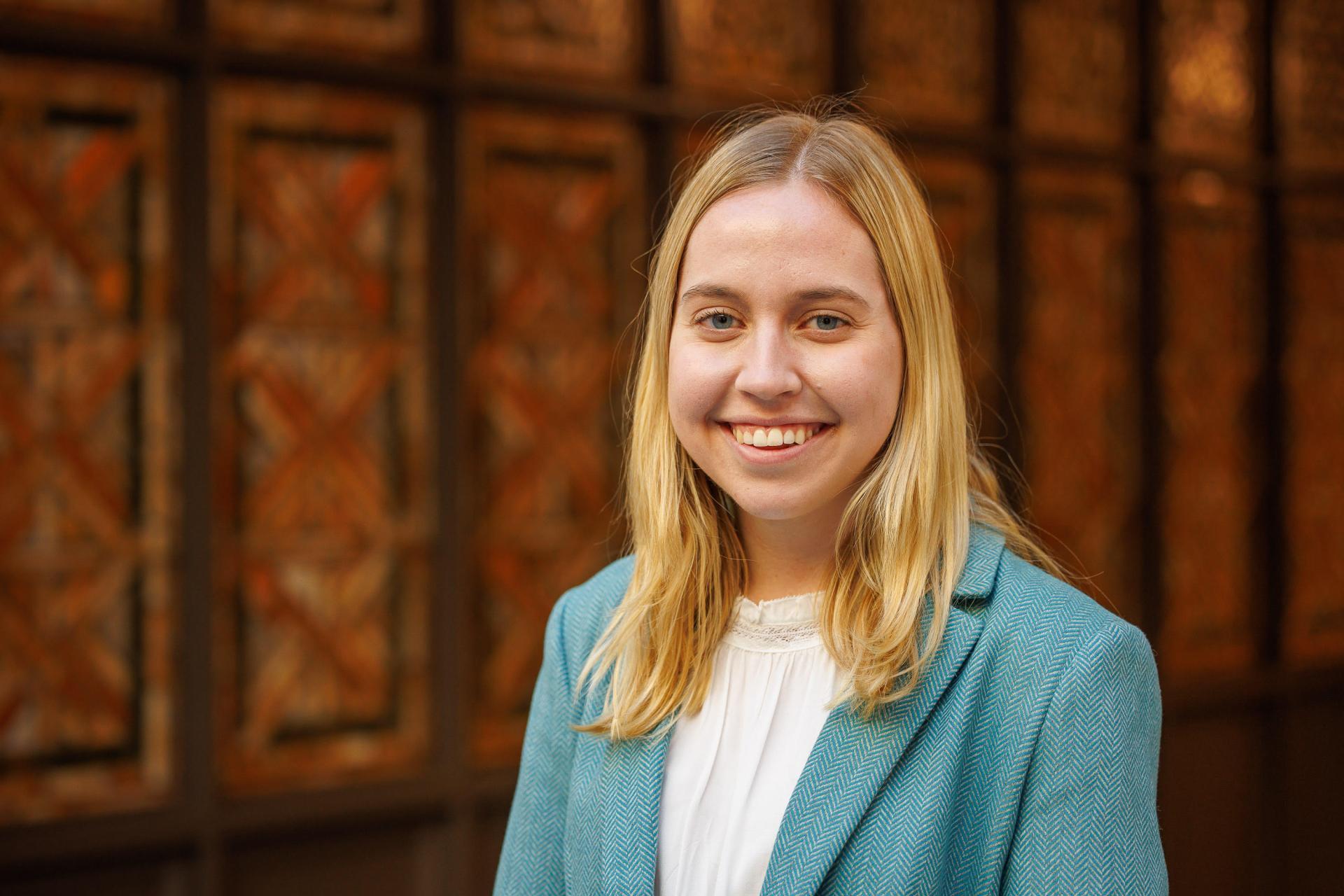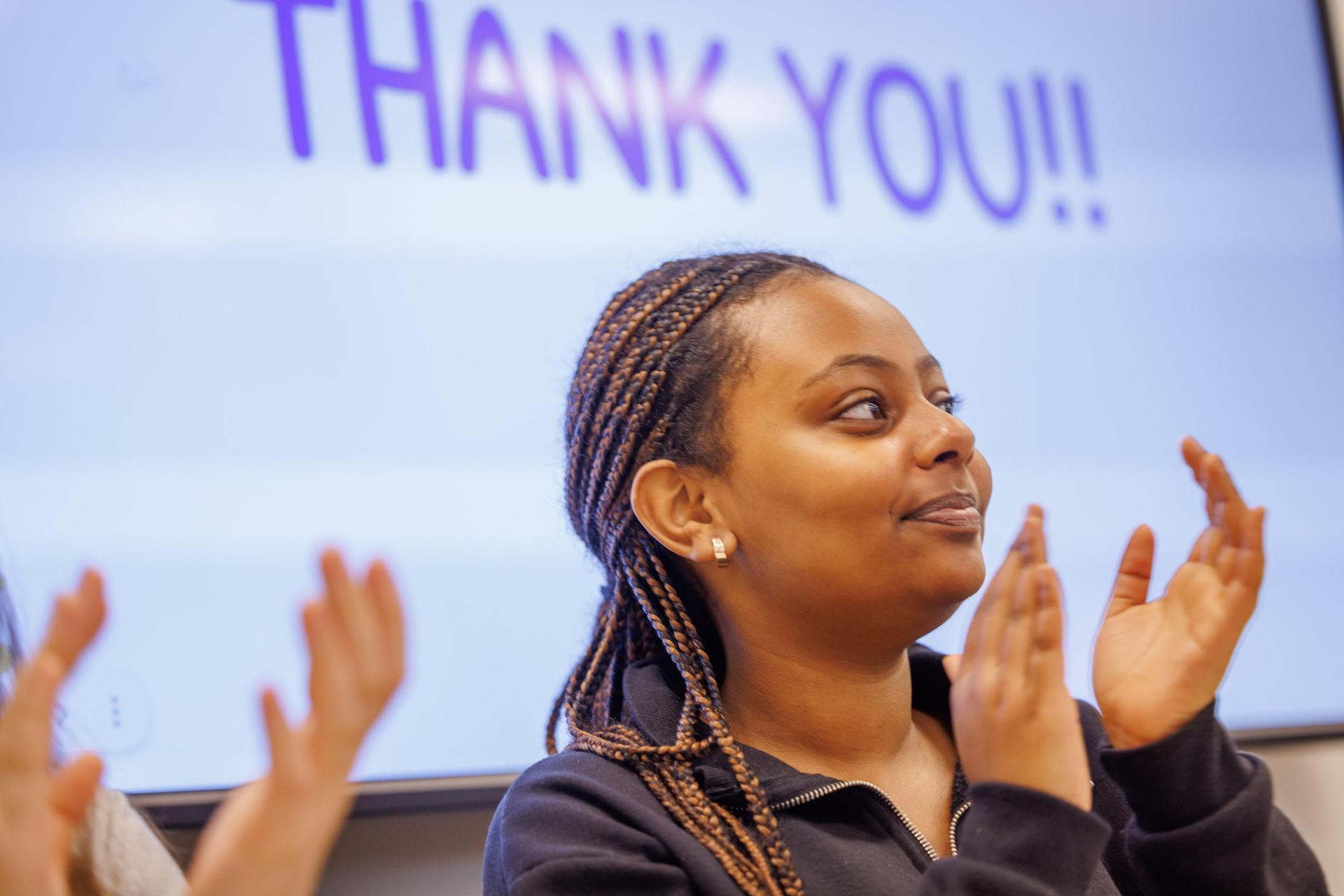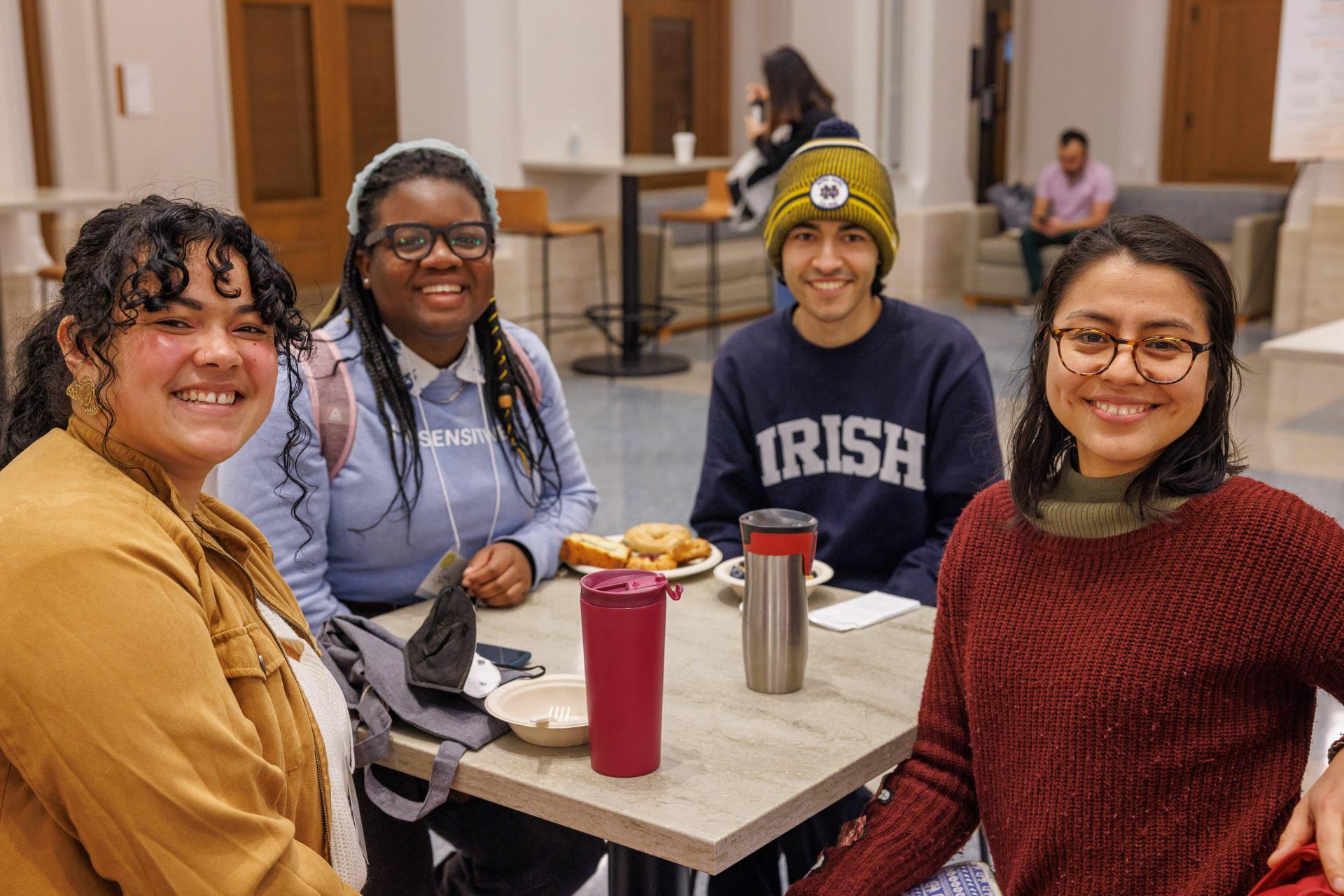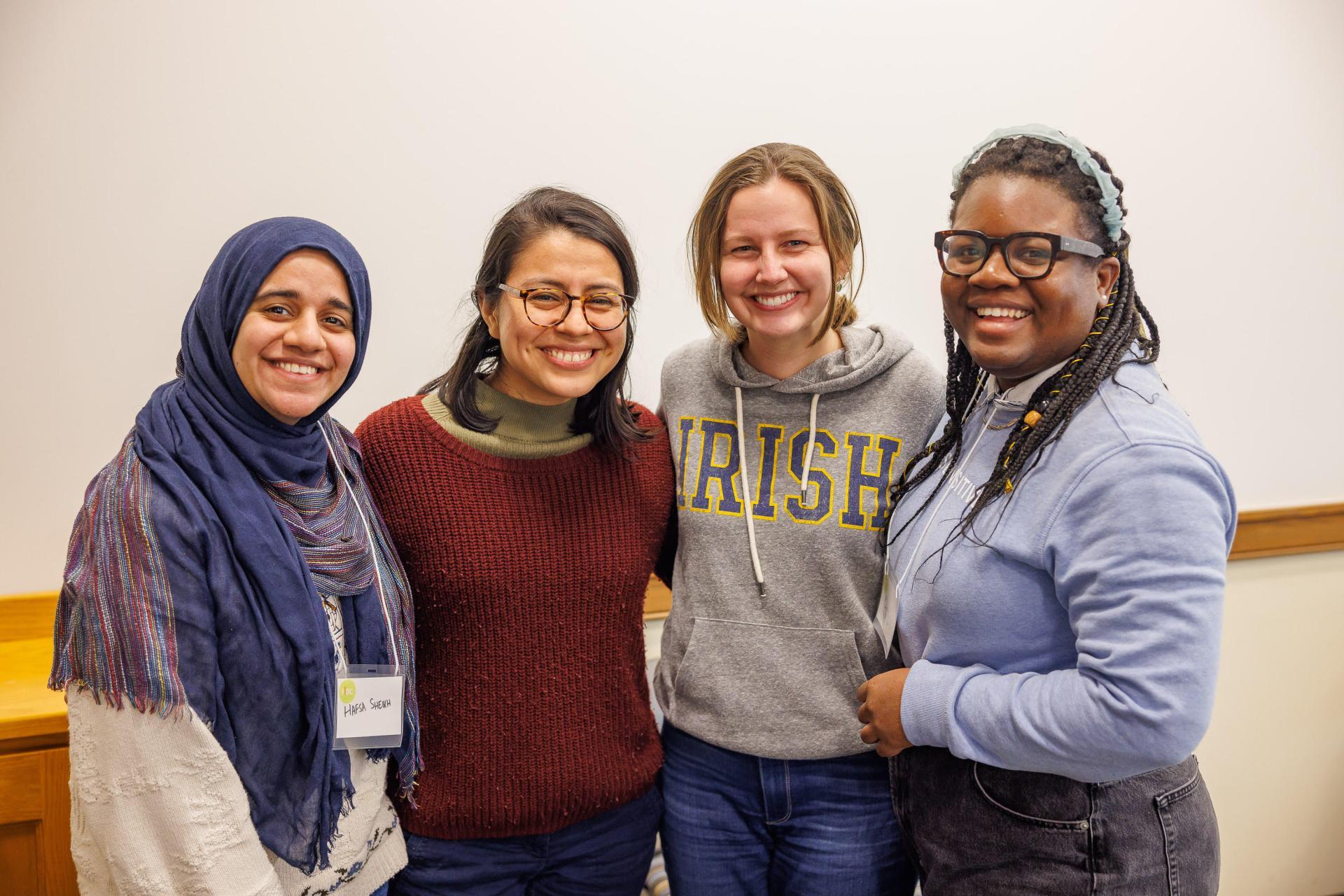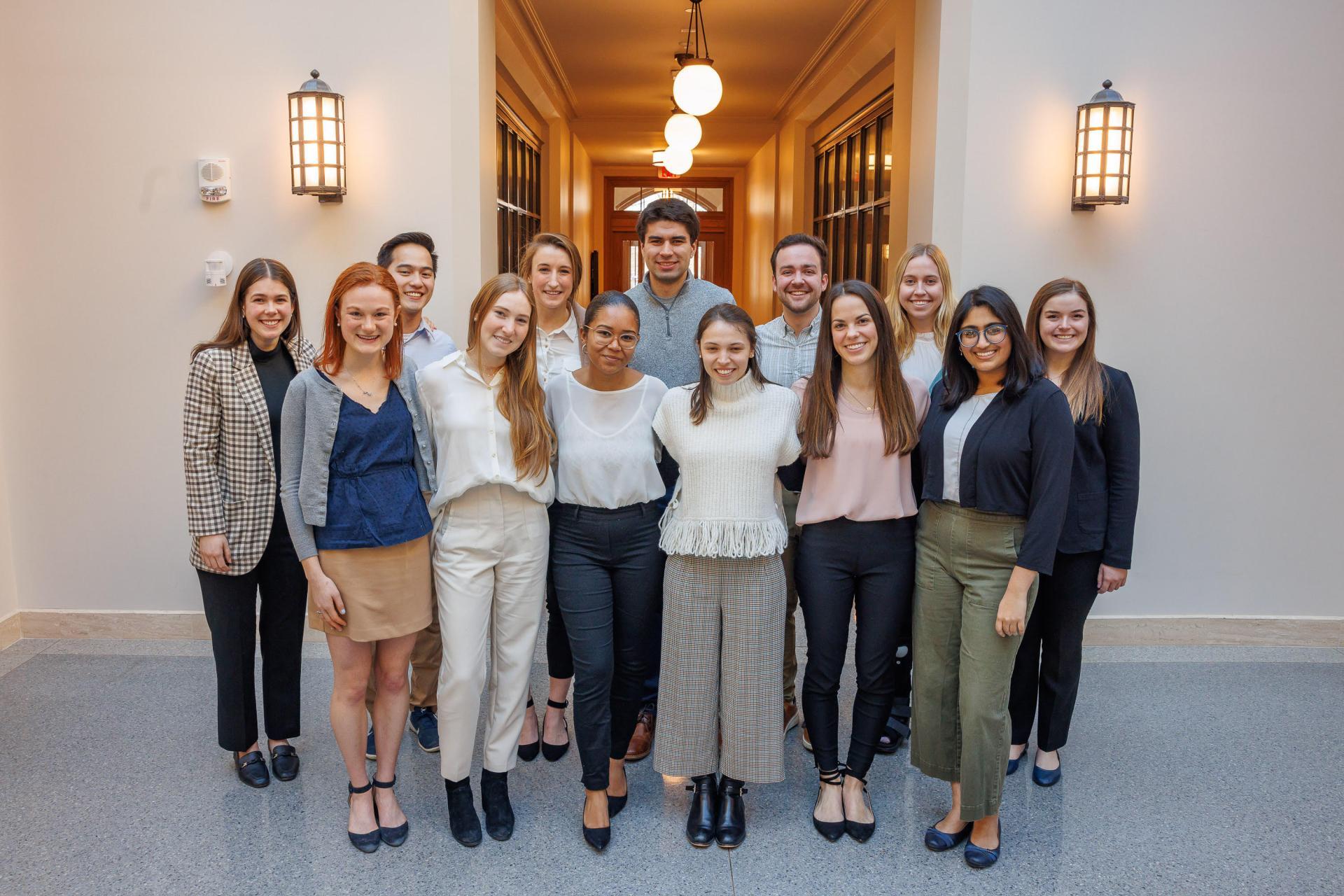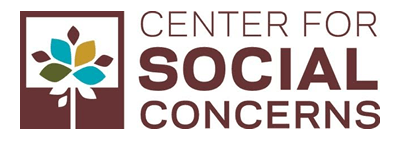Our Global Responsibility: Seeking Inclusive Growth Amidst Widening Inequality
Throughout the past year, the world witnessed widening gaps of inequality in all aspects of our society due to the COVID-19 pandemic. Even today, the pandemic continues to further inequality at all levels — including education, poverty, and public health — disproportionately affecting vulnerable populations. Building off of last year’s conference theme, The Future is Now: Innovative Responses to Global Adversity, the 2022 conference seeks to shed light on the continued need for interdisciplinary innovation and our responsibility as global citizens for collaboration during these times of widespread disparity.
Our Global Responsibility aims to explore inclusive growth beyond an economic sense by encompassing a person-centered approach in the pursuit of equality, sustainable global development, and resilience in the face of widening inequality.
We hope that you will join us in participating in this important conversation!
Conference Program(Please note that all times listed are Eastern Standard Time)
Friday, February 25
|
Keynote Address
This keynote address took place Friday, February 25, at 5:00pm Eastern US time.
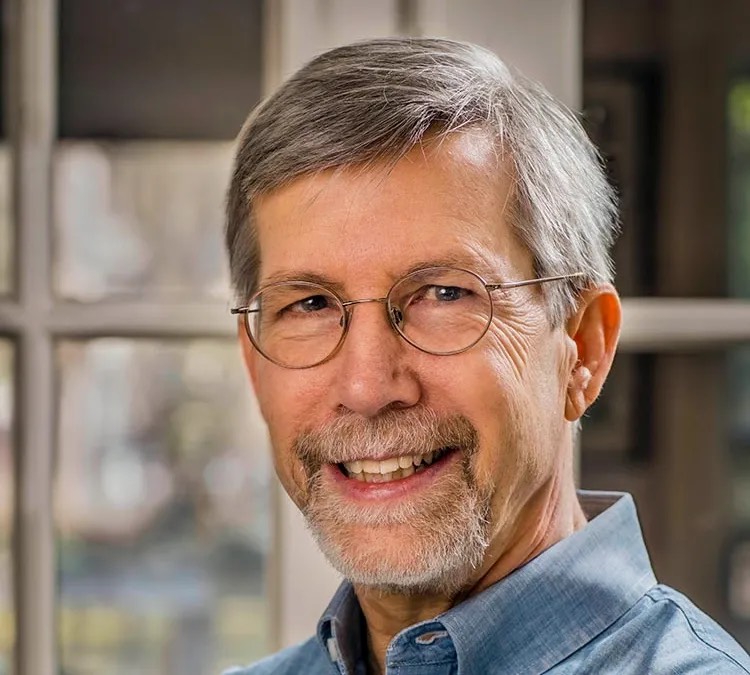
John Cavanagh
We are incredibly excited to invite John Cavanagh to serve as the HDC 2022 Keynote Speaker.
John Cavanagh was Director of the Institute for Policy Studies from 1999-2021, and is now a Senior Advisor at IPS. He directed IPS’ Global Economy Program from 1983-1997. Cavanagh is the co-author of 12 books and numerous articles on a wide range of social and economic issues. His newest book (with Robin Broad) is The Water Defenders: How Ordinary People Saved a Country from Corporate Greed. He co-authored (with Richard J. Barnet) Global Dreams: Imperial Corporations and the New World Order, which sold over 60,000 copies with Simon & Schuster. Cavanagh co-led a 24-person team to create the International Forum on Globalization book Alternatives to Economic Globalization, which sold over 20,000 copies and was translated into 12 languages.
Cavanagh sits on the boards of the Congressional Progressive Caucus Center, the International Forum on Globalization, the New Orleans Workers Center for Racial Justice, the National Guestworkers Alliance, and is board chair of the Fund for Constitutional Government. He is a senior advisor of the Poor People’s Campaign.
Cavanagh worked as an economist for the United Nations Conference on Trade and Development (1978-1981) and the World Health Organization (1981-1982). He served on the Civil Society Advisory Committee of the UN Development Program (2000-2012). He received a Bachelor’s degree from Dartmouth College, and a Masters from Princeton University.
Biography retrieved from the Institute for Policy Studies' website (https://ips-dc.org/ips-authors/john-cavanagh/).
Artist: Luis Sosa Manubes
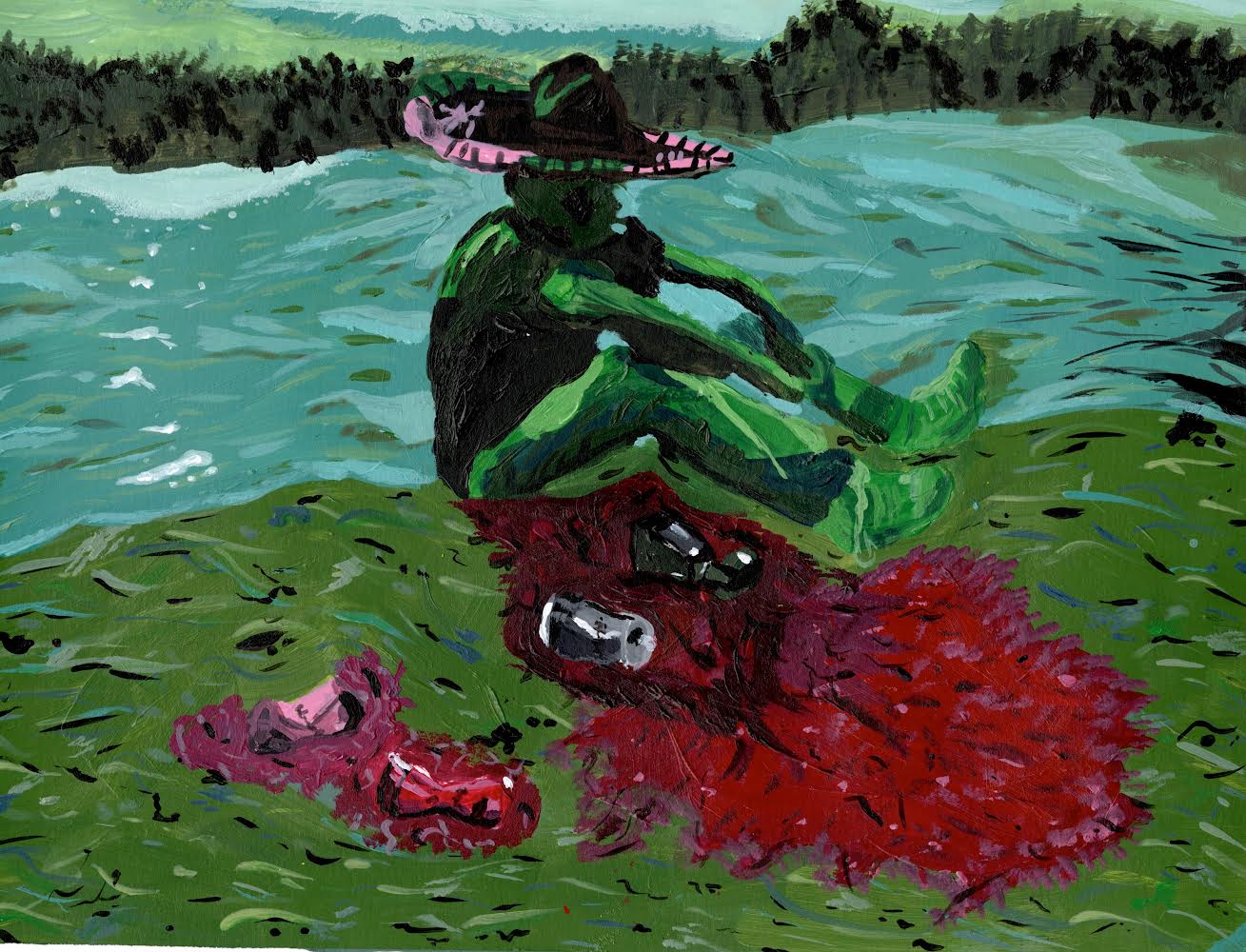
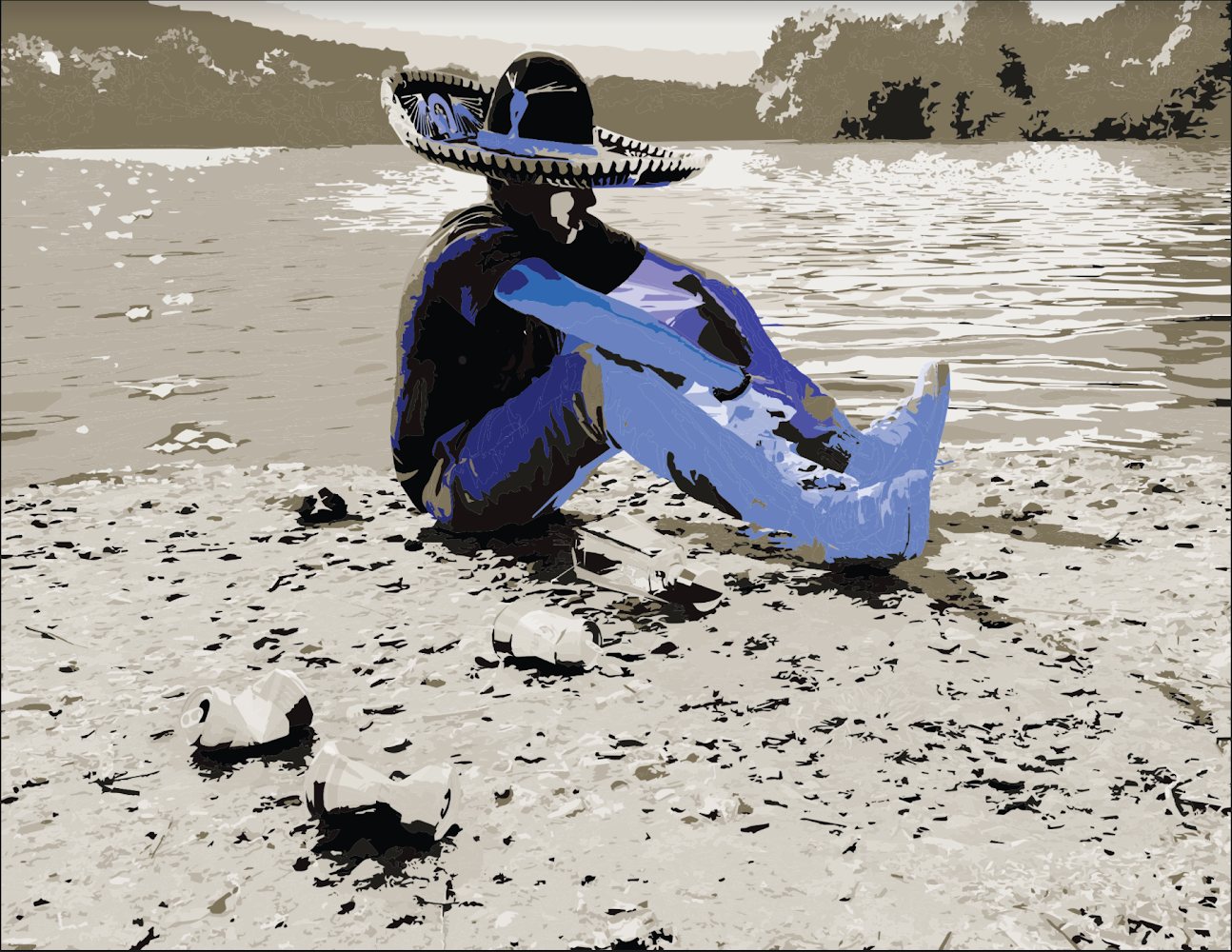
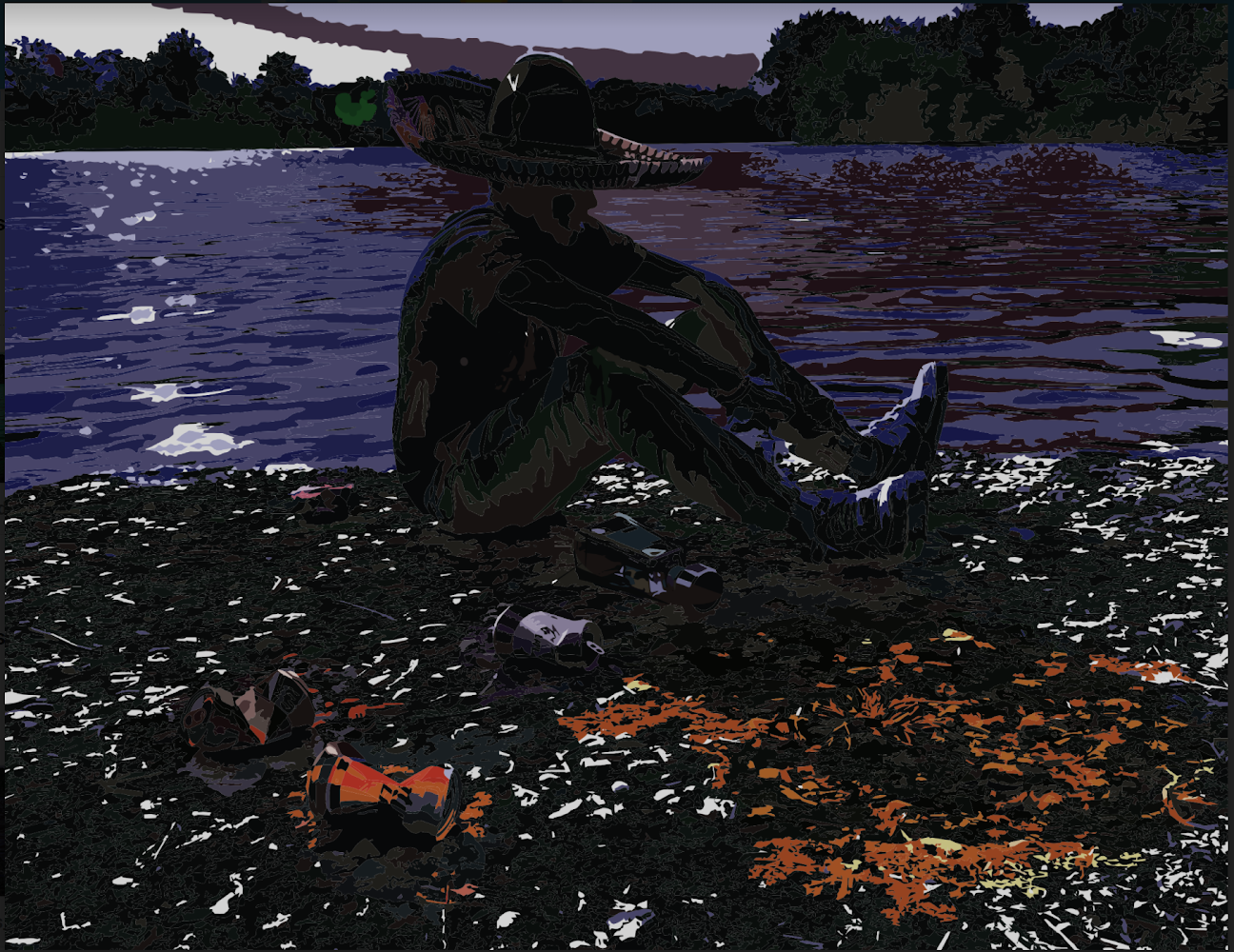
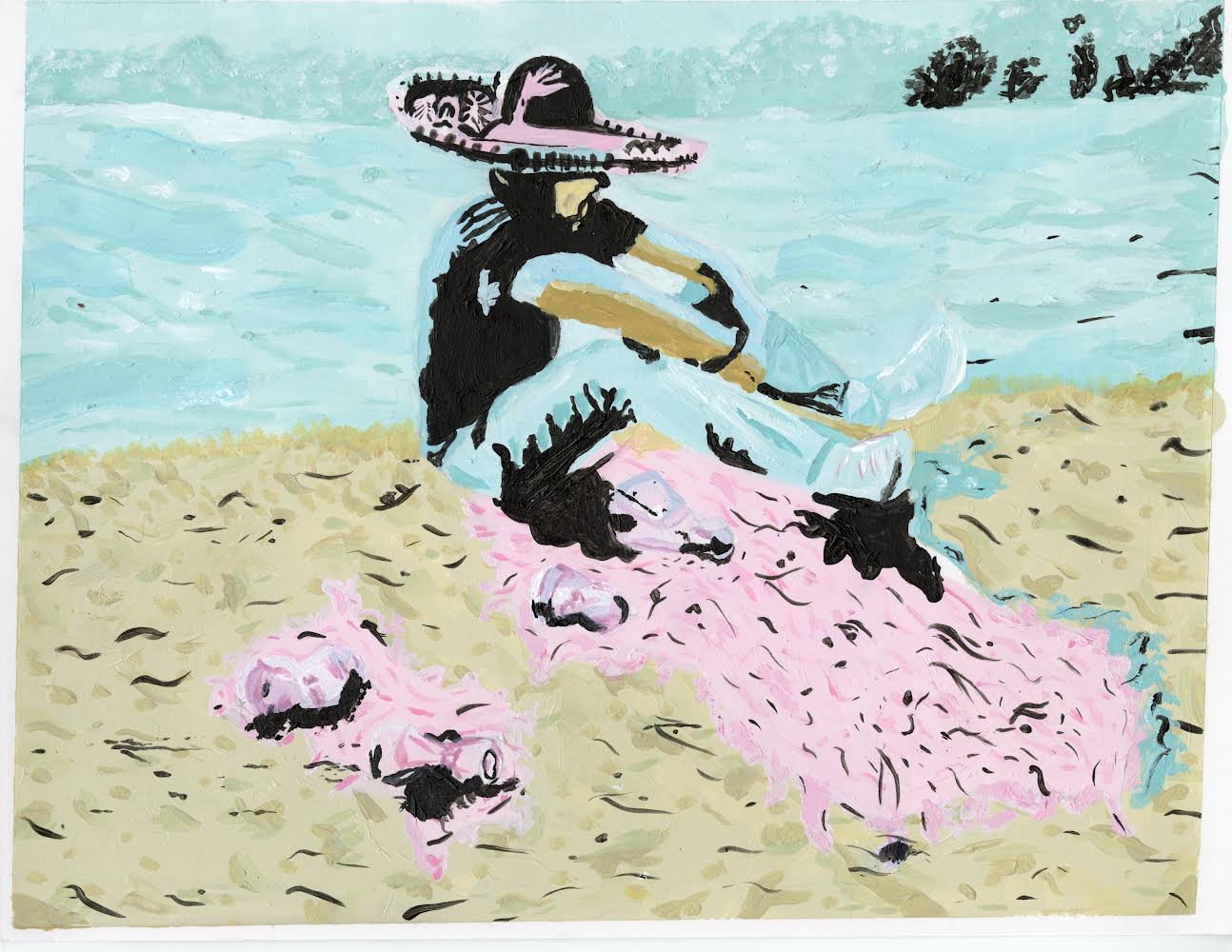
Artist: Rae Stokes
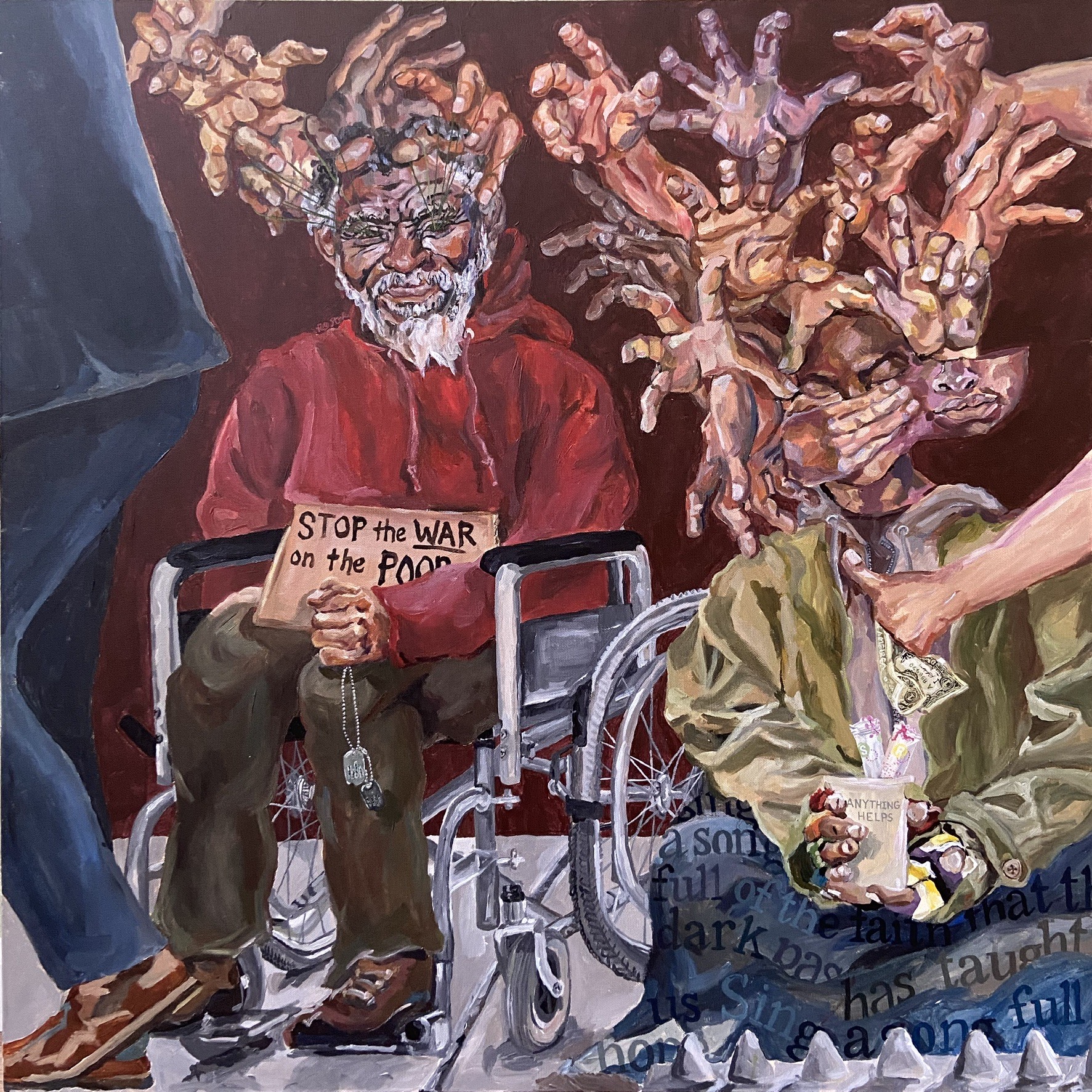
“Normal People” addresses generational trauma that Black people often inherit, and the lack of services for Black people that have a physical or mental disability. This painting also reveals how homelessness is stigmatized and attributed to a lack of work ethic rather than seen as a systemic problem that disproportionately affects the Black LGBTQIA and veteran population.
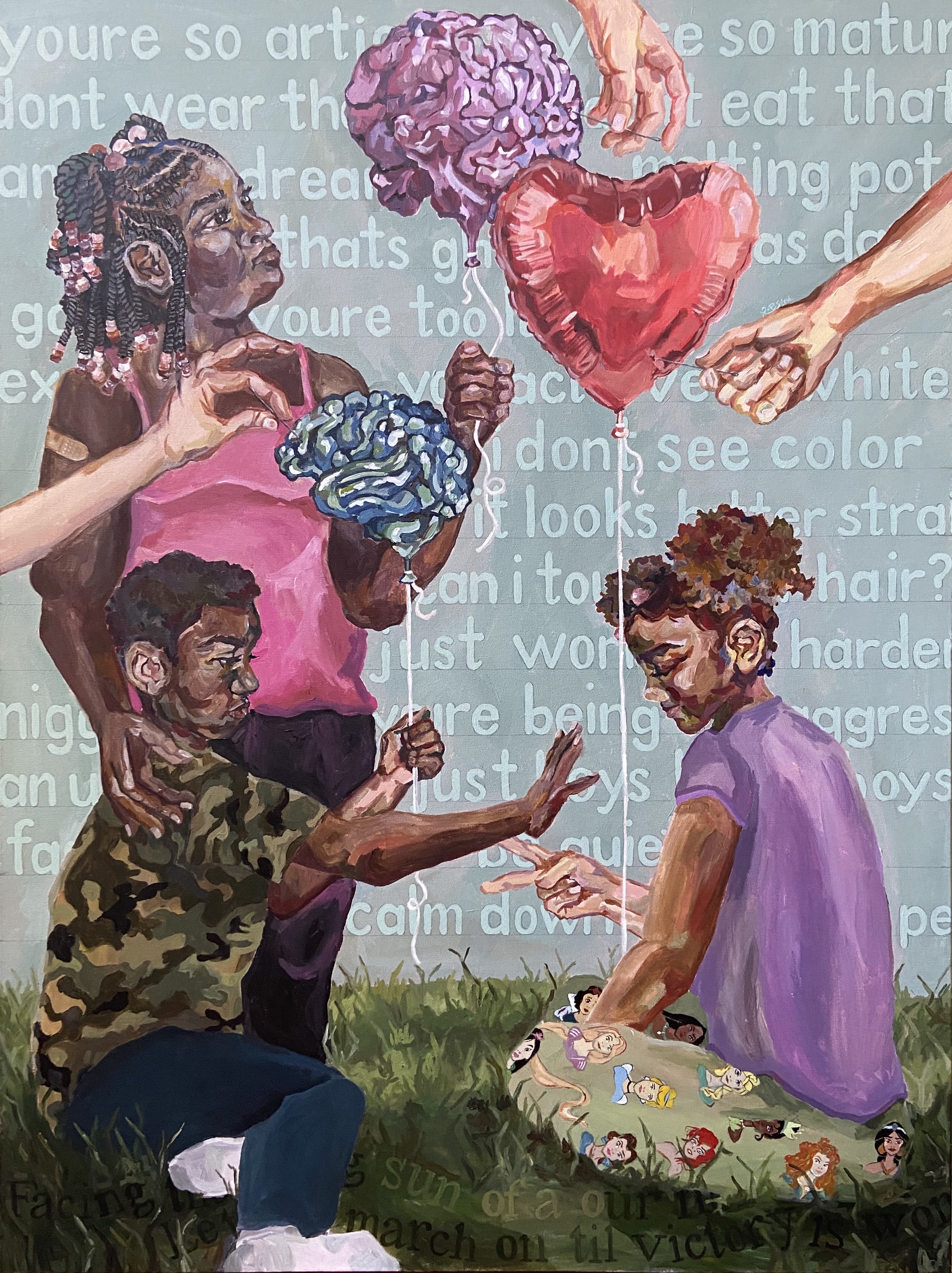
“We Are Still Fighting for You” shows the strength and vulnerability of older Black women, especially transgender women, who are often dismissed in the fight for Black lives despite starting the movement. The “Say Her Name Movement” was even started by Kimberlé Crenshaw to discuss the effects of police brutality on Black women when before it was largely focussed on Black men. However, since this term was coined, “say his name” has become a popular hashtag to talk about male victims of police brutality. Black women are constantly having their voices taken away from them or in some cases people demand they unveil their trauma to them. Either instance is extremely disrespectful and dehumanizing. The people most affected by oppression must be the leaders in the fight against it instead of being the target of further oppression.
Artist: Callie Whelan

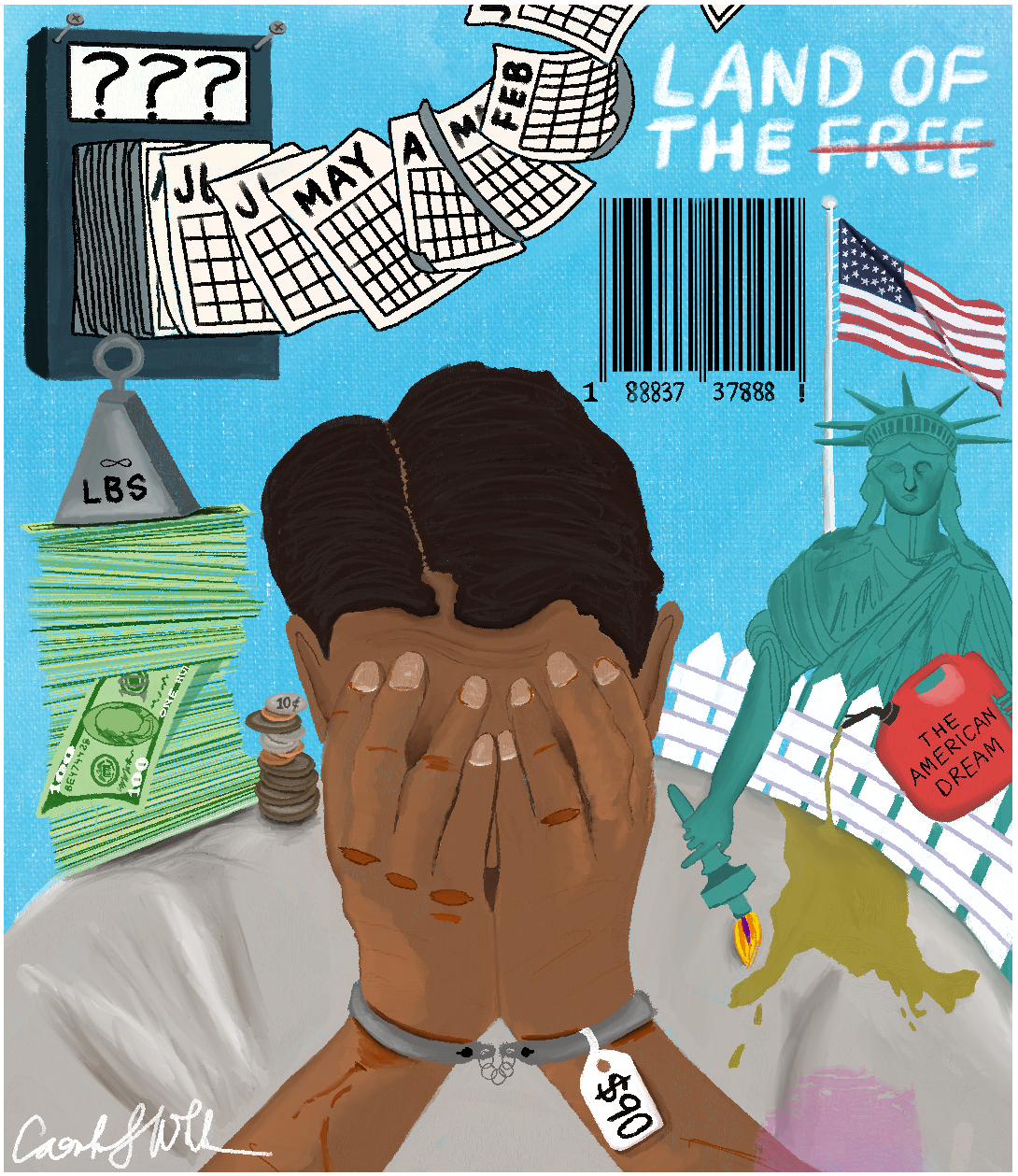
Presenter Bios
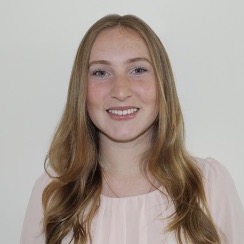
Catalina Ballestas
“Women's Empowerment in Contexts of Displacement: Formal and Informal Leaders in El Pozon, Colombia”
Catalina is a senior studying Business Analytics with a Supplementary Major in Global Affairs. She conducted research on informal and formal female leaders in a primarily displaced neighborhood called El Pozon in Cartagena, Colombia. Catalina completed a capstone under the guidance of Professor Abby Cordova. Her research interests include female empowerment as well as the effects of international displacement, gender inequality, and machismo in Latin America.
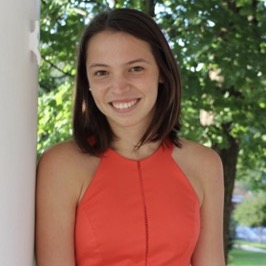
Isabel Barnidge
“Towards a New Definition of International Volunteer: How social unrest in Nicaragua and the COVID-19 pandemic have reshaped the image of the volunteer at the Roberto Clemente Health Clinic”
Isabel Barnidge is a senior at the University of Notre Dame studying Spanish, pre-health, and international development studies. Originally from Arlington, Virginia, she credits her Spanish immersion education and her engagement with D.C. for establishing and promoting her interest in international development studies. She ultimately hopes to combine her global focus and medical interest as a bilingual physician.
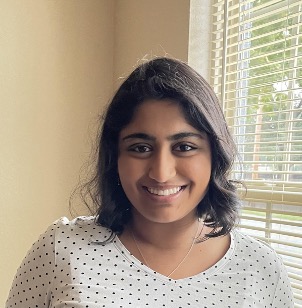
Sanjna Chetan
“Maternal Health and Malaria in Indigenous Tribes in Indonesia”
Sanjna Chetan is a senior Science-Business student on the Pre-Med track with a minor in International Development Studies and Theology. With her research mentor, Dr. Neil Lobo, she has conducted research on malaria and maternal health in indigenous tribal populations of Sumatra, Indonesia. Over the course of this last year, she has synthesized her findings into a comprehensive thesis to aid Dr. Lobo's work in malaria interventions and implementation strategies. In her upcoming gap year before medical school, she plans to further her expand her research to various other countries struggling with malaria and maternal health.
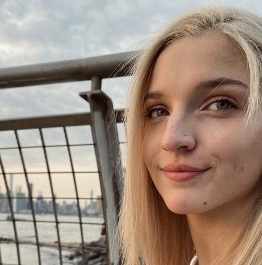
Isabella DiFusco
“Euskal Herria: Bilingualism and Contemporary Identity - A study of sociolinguistic effects on national identity within the autonomous Spanish Basque Country”
Isabella DiFusco is a senior undergraduate student at Salve Regina University in Newport, Rhode Island. Her areas of study include double majors in Global Studies and Dance. Isabella’s main academic interests include linguistic studies in relation to political and cultural landscapes, as well as the role of American dance in contemporary pop-culture and history. Isabella has also studied French and Spanish languages with proficiencies in both. Isabella has recently completed the SIT Spain: International Relations and Multilateral Diplomacy study abroad program in summer 2021. She has recently begun her accelerated Master’s Degree program in International Relations at Salve Regina University.
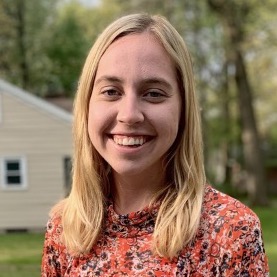
Olivia Dopheide
“My Dream is Farming: Cultivating New Roots in Kansas City”
Olivia is a senior studying Anthropology, Latino Studies and International Development Studies. She has previously worked for the Pulte Institute for Global Development and contributed to a project involving community development in Peru and a joint project with the United States Agency for International Development. Olivia has also worked in Ghana to promote community water enterprises with the non-profit organization, Saha Global. Olivia’s interests include migration and displacement, leading her to conduct anthropological research focused on refugee integration in the United States via an agricultural training program in Kansas City. Olivia is currently working for Kellogg Institute Events team and tutoring children through La Casa de Amistad. Outside of academics, Olivia enjoys dogs, coffee and enjoying walks on campus. She is one of two winners of the 2022 Bartell Prize.
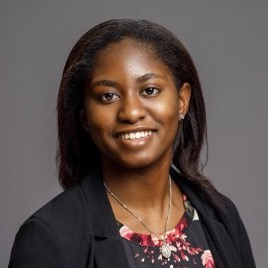
Jennifer Eburuoh
“Understanding Ecoviolence, Self-Determination and Coloniality in the Niger Delta”
Jennifer Eburuoh is a junior at the University of Notre Dame studying Environmental Sciences and Global Affairs with the International Peace Studies Concentration. Through her studies and extracurriculars she examines the intersections between conflict, peace, and the environment. She interns with the South Sudan Team of the Sant’Egidio Foundation for Peace and Dialogue. On campus, she serves as president of the Catholic Relief Services Ambassadors through which she engages in advocacy and education on issues of global concern. As president, she has led meetings with representatives of both Indiana Senators to discuss immigration policy. As a Rev. Don McNeill, C.S.C. Leadership Fellow, Jennifer is trained in active citizenship. Additionally, she serves as an officer of the International Justice Mission Notre Dame Chapter which works to combat human trafficking. Jennifer also is a past participant of the Kroc Institute’s Madrasa Discourses Program.
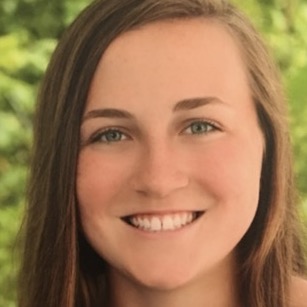
Elizabeth Erisman
“Effectiveness of the Community Land Trust Model in Developing Countries and in Mitigating the Impact of Global Crises”
Elizabeth Erisman is a senior from Baltimore, Maryland studying Economics, Global Affairs, and International Development. Throughout her undergraduate career, she has cultivated her research interest in the effects of urbanization, specifically focusing on the issue of secure housing and property rights in informal settlements. The International Development Studies program has provided invaluable experiences in and out of the classroom that have challenged her perspectives and informed her career aspirations. She interned with Catalytic Communities in the summer of 2021 conducting international research on the Community Land Trust model. This was a formative experience for developing her capstone research project which she looks forward to sharing with others at the 2022 Human Development Conference!
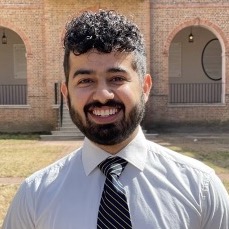
Sasan Faraj
“Identifying the Minimal Set of Geospatial Features for Computationally Accessible Poverty Estimation”
My name is Sasan Faraj, and I am a junior at William and Mary pursuing a data science major with an algorithmic. I have strong research interests in machine learning, specifically in deep learning and random forest regressions. Thankfully, I have gained hands-on machine learning experience as a research assistant for AidData, a geospatial research organization that I work for. Aside from my academics, I enjoy spending time with my family, cooking food with my friends, and walking around or kayaking in the many lakes and creeks around my campus. I look forward to gaining experience in the geospatial field as it pertains to data science and machine learning.
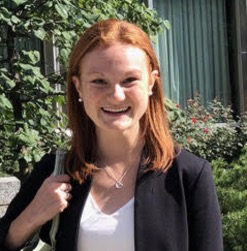
Annie Foley
“Critical Source Analysis During Conflict: The Case of Eastern Democratic Republic of the Congo”
Annie is a senior at the University of Notre Dame majoring in Anthropology and Global Affairs. She has research interests in transnational armed group activity and the spread of militant Islam. Annie has explored these topics through various Africa-focused internships and research positions. Currently, Annie works as a research assistant for Dr. Rachel Sweet studying state involvement in armed conflict in east Africa as part of the Kellogg International Scholars program. Her capstone and thesis are both extensions of this work and focus on the Democratic Republic of the Congo as a case study. Annie plans to pursue a policy career that integrates research and advocacy for those affected by violent conflict.
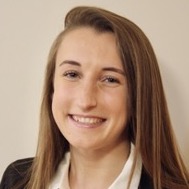
Olivia Foley
“The Resilient Medical Cold Chain in Belize”
My name is Olivia Foley, and I am currently a senior at the University of Notre Dame. I am majoring in Science-Business on a pre-med track and minoring in International Development Studies. I am currently applying to medical school for the 2021-2022 cycle and intend to matriculate immediately after graduation. Along with my interest in becoming a practicing physician, I am also extremely interested in exploring all of the various facets that comprise global health. I have spent my undergraduate studies looking for ways to connect my interest in clinical care with my passion for global development and have found many great opportunities to do so through my relationships with the Kellogg Institute for International Studies as well as the Pulte Institute for Global Development. My research focuses on the impact logistics and infrastructure have on medical cold chains, allowing me to expand my understanding of global health overall.
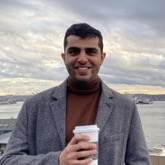
Shivam Gomber
“Access to Medicines and Vaccines - Human Rights Perspective”
I am an undergraduate law student in the major of health law. I am from Delhi, India. I aspire to build a strong professional network from a diverse study environment during my studies which will help me grow exponentially. This paper presentation will help me understanding as to how to deal world problems and how to solve them. My long-term goal is to establish a healthcare organization that can provide affordable and accessible healthcare to people of our community. This fellowship will help me in getting the necessary skills needed to improve an organizations capacity in the globalized world which will help me in my career when I will be dealing with various aspects of law which in turn will provide access to healthcare.
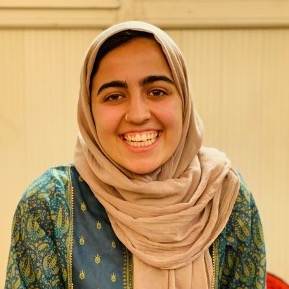
Haia Haidari
“‘It's All Pakistan's Fault?’ The Impact Pakistan has had on Development in Afghanistan"
My name is Haia Haidari. I am a senior at Saint Mary’s College of California, studying Politics and Theology. I am first-generation Afghan Muslim American, which has influenced a lot of my experiences and research. I was born and raised in California where my parents taught me the history of my country and its culture. I am interested in post-colonial theory in Afghanistan, impacts of education on terrorism in the Middle East, and the impact of foreign actors in Afghanistan. In the future, I hope to go back to Afghanistan and help rebuild the educational policies and curriculums.
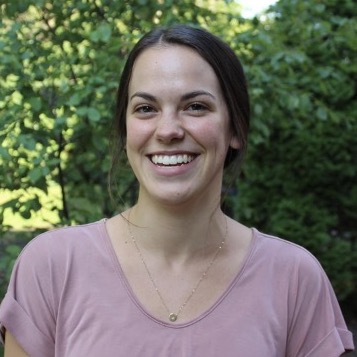
Mariah Horvath
“The Effects of the COVID-19 Pandemic on the Mental Health and Psychosocial Wellbeing of Palliative Care Providers in Uganda”
Mariah is a senior from Denver, CO studying Neuroscience and Behavior, and International Development Studies at the University of Notre Dame. The COVID-19 pandemic and Mariah's passions for neuroscience, mental health, and international development led to her interest in the effects of the pandemic on the mental health and psychosocial wellbeing of health care workers, especially those working in low-resource settings. Together with Professor Lacey Ahern, the Palliative Care Association of Uganda, and Dr. Simon Kizito of Makerere University, Mariah's research seeks to understand how the COVID-19 pandemic has affected the mental health of Ugandan palliative care workers and their access to psychosocial support and mental health resources. Given challenges associated with the pandemic, the project is still ongoing but her research team hopes it will provide insight into how palliative care organizations can better support the mental health of their providers during the current and future pandemics.
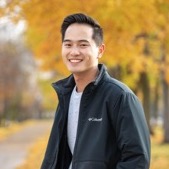
Michael Lee
“Evaluating Menstrual Health in Kakira Town Council, Uganda”
Michael Lee is a senior Biology major and International Development Studies minor from Newton, MA living in Keenan Hall. For his capstone project, Lee worked virtually with the Foundation for Sustainable Community-based Development and Kakira Outgrowers Rural Development Fund in Jinja, Uganda to investigate community menstrual health programs. Over the course of the project, the team surveyed community members on their menstrual health experiences and how current clinics and administrations could be improved to better meet their needs. As an aspiring doctor, Lee's interest in development stems from his desire to widen his understanding of health and focus his future practice with a global lens. His time with the Kellogg Institute has allowed Lee to explore topics in global health and health policy which continue to guide his future career discernment.
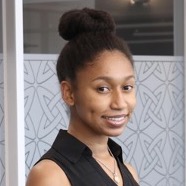
Ashley Lizana
“Black Girls and School Discipline: A Story on Adultification”
Ashley Lizana is a senior at the University of Notre Dame studying Political Science, French, and Education. She is originally from Southern California, and plans to return to the West Coast after graduation to work with Levi Strauss & Co in Human Resources. She assisted a Notre Dame Ph.D candidate researching the impacts of climate change on human conflict within numerous countries. Her interest in sustainability initiatives and human rights has led her to become the Vice President of GreeND (the campus sustainability club) and Frontline Multicultural Advocacy Club. Ashley is also passionate about educational equity, which led her to take on the Education, Schooling, and Society minor her sophomore year. This past fall semester she conducted a research capstone project about the impacts of school discipline on the decisions and psyches of Black female students in middle and high school. She is very excited to present at the conference.
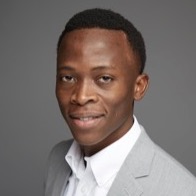
Trevor Lwere
“New Visions”
Trevor Lwere is a senior from Kampala, Uganda. Lwere works with Prof. Jaimie Bleck in the political science department to study the incentives for civil society organizations to flag corruption in Mali. He is working on a senior thesis that is analyzing Africa’s past attempts at development and some of the available alternatives to development on the continent. Lwere received grants to conduct independent research on the evolving relationship between youth and political parties in South Africa and how smallholder farmers in East-Africa interact with the global agricultural value chain. Lwere has presented his research at the Midwest Political Science Association Conference, the ACC Meeting of Minds Conference and the Human Development Conference hosted by the Kellogg Institute. He spent Fall 2021 at the School of Oriental and African Studies (SOAS) at the University of London in London, UK. Lwere is a Hesburgh-Yusko scholar and a member of the Glynn Family Honors Program.
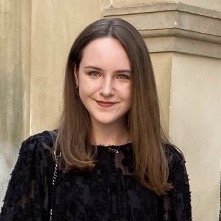
Sofiia Makohin
“Looking for the ways to reach equality: are there any answers on a macro level?”
I am in my fourth year of the Ethics-Politics-Economics Bachelor program at Ukrainian Catholic University. During my studies, I had a chance to be an Erasmus Exchange Student at the University of Bayreuth at the Philosophy and Economics program (summer semester 2021). Furthermore, I am an active volunteer and participate in a variety of local and international schools: "Ethics and Religions in Politics and Economy" (January 2021), "From Politics to Policies" (Lviv, September 2021), "Thinking Wider, Thinking Beyond" (Magdeburg, December 2021). Also, I have a published report called "The hidden power of migrant remittances" in terms of the Scientific Conference "Global Versus National Perspectives" at the Faculty of International Relations, Ivan Franko National University of Lviv (June 25, 2020). Currently, I am a representative of the International Association for Political Science Students (Ukraine) in Europe. I provide Ukrainian political science students with information about educational conferences and exchange programs at European universities to advance academic research. My main fields are political philosophy, social and economic inequality, international relations, development theories, and political economy.
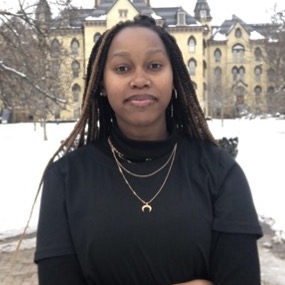
Xolisa Ngwenya
“Peace-building and the Youth in Belfast, Northern Ireland”
Xolisa Ngwenya is a senior at the University of Notre Dame studying psychology and business economics. Through opportunities offered by The Centre for Social Concerns and Kellogg, Xolisa has managed to integrate her passion for international development with research. Her first exposure to international development was through her Virtual International Summer Service-Learning Program in Guatemala, where she worked with a team of other students to improve youth participation in entrepreneurship. This led her to explore other areas of youth international development. Translating her interest in international development into research, Xolisa conducted an independent research project in Dr. Cumming’s Family Studies Lab, focusing on the Northern Ireland region—a region with political conflict. She hopes to continue her work in research alongside her interests in human development.
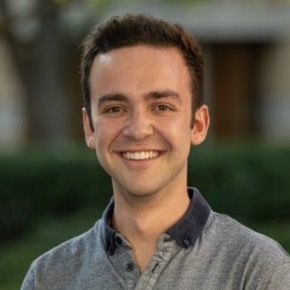
Jackson Oxler
“Queens is the Future: Immigrant Experiences of Structural Violence in Housing in New York City”
Jackson Oxler is a senior at the University of Notre Dame majoring in Anthropology, Political Science, and Global Affairs with a concentration in International Development Studies. His research interests in development surround access to affordable and sustainable housing, and the particular challenges that face migrants in the housing industry. As a member of the Kellogg International Scholars Program, Oxler conducted research on educational integration efforts and migration in Europe with Fr. Timothy Scully and Fr. Robert Dowd.

Marharyta Pavliv
“Inequality in postcolonial countries”
I am a 4th-year student of the bachelor's program "Ethics-Politics-Economics" at the Ukrainian Catholic University in Lviv. During my studies, I had a lot of interesting experiences in and out of the university. One of the last such experiences was Erasmus International Mobility at the University of Bayreuth in Germany in the program "Philosophy and Economics" during the summer semester of 2021. I have also repeatedly participated in various schools. Such as "English Summer School" (July 2019), "Ethics and Religions in Politics and Economy" (January 2021), "From Politics to Policies" (Lviv, September 2021). In addition, I often served as a volunteer at various events, as well as volunteering at an orphanage. The focus of my studies is political psychology, including voter behavior, political economy, inequality, and discrimination.
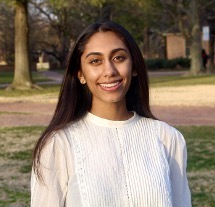
Jahnavi Prabhala
“The Exodus Project: Addressing Inadequate Menstruation Hygiene Management (MHM) in Venezuelan Migrant Communities in Colombia”
Jahnavi Prabhala is a senior at William & Mary, studying Economics and Biology, on the pre-medical track. Through the W&M Global Research Institute's Summer Fellows Program, Jahnavi worked at the international NGO, iMMAP. Her work took her to Bogotá, Colombia, where she collaborated with humanitarian partners to conduct research on the Venezuelan migration crisis. After returning to the U.S., her passion for global health security drove her to found the Exodus Project by mobilizing support from humanitarian and development stakeholders. The project aims to create sustainable, data-driven reproductive health care infrastructures that support female migrants in Colombia. In her local community, she volunteers at a rural safety net clinic, working in the OB-GYN department as a Spanish medical interpreter and medical assistant. As an aspiring doctor, she ultimately hopes to create culturally-sensitive, evidence-based health programs that benefit many individuals in communities facing scarcity and crisis – even ones she never treats as patients. She is one of two winners of the 2022 Bartell Prize.
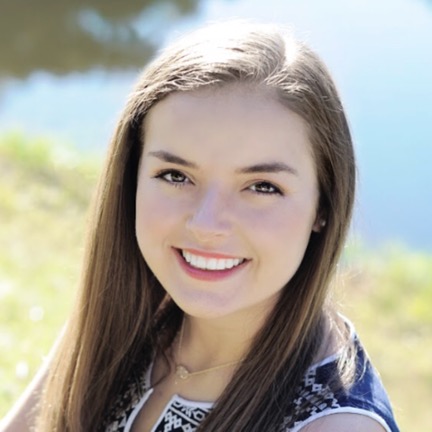
Kat Relick
“Cultural Accommodation of Global Anti-Human Trafficking Organizations”
Hi, my name is Katherine Relick. I am a senior at the University of Notre Dame studying Anthropology and Global Affairs with a concentration in International Development Studies. Originally, I am from Canton, Georgia, but my family now resides in Nashville, Tennessee. Following graduation in May, I plan to do a year of service before heading on to medical school to become a physician. During my time at Notre Dame, I have had the opportunity to get involved in some incredible opportunities. I am a McNeill Fellow at the Center for Social Concerns, through which I volunteer at DePaul Academy. I was able to do research on human trafficking organizations thanks to assistance from the Kellogg Institute. I also get to help fundraise and organize for Camp Kesem Notre Dame as a Development Co-Coordinator.
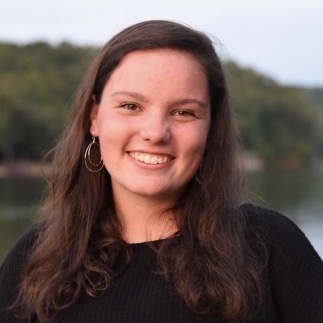
Natalie Selover
“Modern Native American Migration and Reservation Return Rate”
Natalie Selover is a junior at the University of Notre Dame studying International Economics with minors in Poverty Studies and Education, Schooling, and Society. She is originally from Atlanta, Georgia, and recently spent a semester studying in Angers, France. Over the course of her time at Notre Dame, Natalie has become interested in issues related to indigenous communities in North America and focuses much of her Poverty Studies and ESS coursework on Native studies. Classes on the economics of immigration and the history of Native American education helped motivate her research, which focuses on modern migration of Native Americans between reservations and urban areas. In her free time, Natalie enjoys swimming, playing music, and organizing events in Johnson Family Hall.
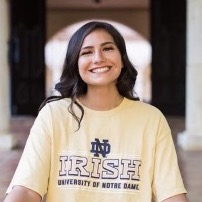
Denise Shaffer
“Education at the Border: Building a Curriculum for Migrant Children”
Denise is a senior at Notre Dame from Houston, Texas. She is a double major in Anthropology and Global Affairs with a concentration in International Development Studies. Denise also has minors in Theology, Catholic Social Teaching, and Education, Schooling, and Society. All of these unique areas of study have brought Denise to a passion of ensuring quality education for the marginalized. She has expressed this passion in her experiences as a preschool teacher in her hometown, an English teacher to adults in Ecuador, and as a student researcher to Dr. Katy Lichon working on Latinx inclusion in US Catholic Schools. These experiences ultimately led to her work with migrants at the US-Mexico border and her passion for bringing education to migrant children. Denise hopes to continue to serve the Latinx and migrant communities as she pursues her masters in education and in her life beyond. She is very excited to share her passion and work at this year’s HDC!!
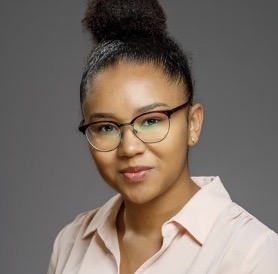
Diana Spencer
“Financial Inclusion for Women Micro-Entrepreneurs: A Comparative Study of Conventional and Islamic Microfinance in Senegal”
Diana is a senior from Dakar, Senegal majoring in Economics, Global Affairs, and Gender Studies. She is also part of the Glynn Family Honors Program and the Merit Scholars Program. With a concentration in International Development Studies, Diana’s research interests lie in the economic empowerment of women in developing countries. In 2020, she conducted a research project in Senegal to measure the influence of conventional microfinance and Islamic microfinance on the living conditions of women entrepreneurs. Diana is also interested in entrepreneurship and has had various international experiences in that field. Over the last two years, she worked with Ashoka in Brazil and interned virtually with Social Entrepreneur Corps (SEC) in Guatemala. On campus, Diana is involved with the Kellogg Institute, the International Student Advisory Board, and the African Student Association. Outside of class, Diana enjoys baking and photography.
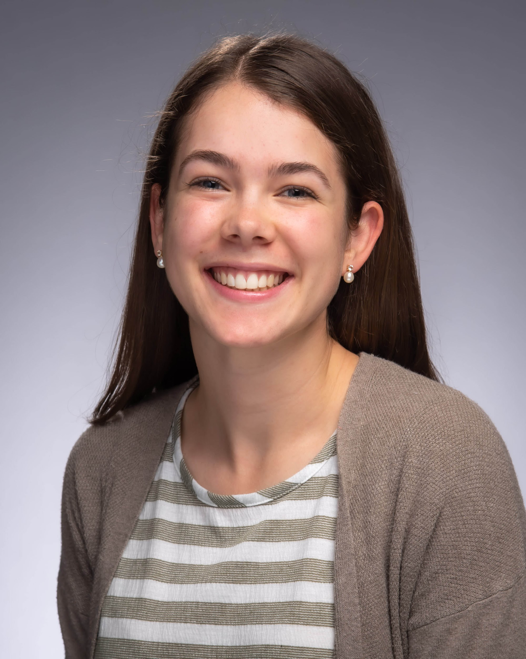
Maria Teel
“A Benchmark Analysis of Multilingual Education Policy and Practice in Senegal”
Maria Teel is a senior at the University of Notre Dame studying Political Science, French, and International Development Studies. On campus, she conducts education research in the International Education Research Lab and supports development projects as a program assistant at the Pulte Institute for Global Development. She also has experience in social entrepreneurship and entrepreneurship consulting through internships with the Mandela Washington Fellowship for Young African Leaders, the South Bend Entrepreneurship and Adversity Program, and Sustain Micro Enterprise. She is the conference co-chair of the 2022 Human Development Conference and her independent research addresses the potential for successful multilingual education in Senegal.
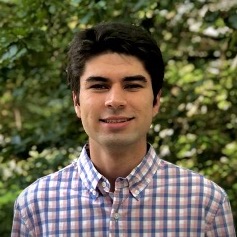
Zach Thapar
“Better Together: How NGOs Can Collaborate to Solve Some of the World’s Greatest Challenges”
Zach Thapar is a senior at Notre Dame, where he studies political science, global affairs, and international development studies. On campus, Thapar is a member of the Kellogg International Scholars Program, through which he conducts research with Professor TJ D’Agostino on international education. Past research topics have included a study of the impact of Catholic education on members of the African Diaspora in New Orleans and an analysis of the impact of Indiana’s voucher program on socio-economic and racial integration. In the summer of 2019, Thapar spent five weeks in Trujillo, Peru, working with nonprofit Vive Peru on developing a socio-emotional learning program for disadvantaged children. Last summer, he interned in the Margaret Thatcher Center for Freedom at the Heritage Foundation, working with experts on topics including U.S.-U.K. relations, international law, and Middle East politics. Thapar’s current research covers the lack of collaboration between NGOs globally.

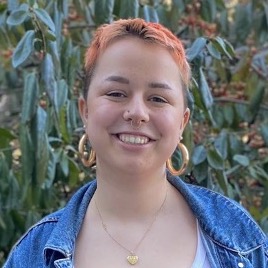
Nat Urban
“Children's Literature as a Site for Feminist Thought”
Nat Urban is a graduating senior at Butler University with a triple major in Race, Gender, and Sexuality Studies, Creative Writing, and Spanish. Their research interests focus on trans studies, the power of narrative and language, and queer literature. Their study of the Spanish language as well as English literature has made them extremely aware of how we label and describe ourselves and the world around us. Narratives and language often become sites where structures of oppressive power recreate themselves, from children's stories to fantasy, to nonfiction and textbooks. This coming semester they will be conducting an independent study around queerness and naming, featuring an interview series, reading a collection of queer literature, and pursuing research questions that will culminate in a collection of poems and creative essays on the topic.
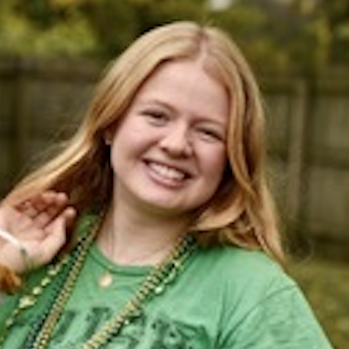
Juliet Webb
“Female Genital Mutilation and Migration: An Unlikely Link in the Age of COVID-19”
Originally from Larchmont, New York, Juliet Webb is a junior at the University of Notre Dame studying Anthropology, Peace Studies, and Education. Since 2020, she has been a member of the International Education Lab under Professor TJ D’Agostino, researching educational initiatives, policies, and trends in various contexts across the globe. After an incredibly meaningful trip to Senegal in high school, Juliet has been determined to incorporate the incomparable beauty and wisdom of the West African country and its culture into her Notre Dame life; in the summer of 2021, she worked as a virtual intern for the Senegal-based Global Research and Advocacy Group researching the practice of female genital mutilation in Senegal. As a culmination of both this internship and her participation in Notre Dame’s International Summer Service Learning Project, Juliet conducted independent research on the linkage between migration and female gential mutilation in the particular age of COVID-19.
Artist Bios
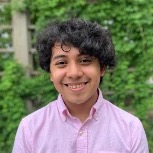
Luis Sosa Manubes
Artist of El Charro en su Violencia (The charro in his violence), El Charro en su Soledad (The charro in his loneliness), El Charro en 2 de Noviembre (The charro on Nov 2nd), and El Charro en Azul y Rosa (The charro in pink and blue)
I am a Mexican artist and an immigrant to the United States. My body of work mainly revolves around social concerns I feel a personal connection to such as racism and gender norms. I seek to highlight the beauty of my culture while recognizing the many problems we face as a community.
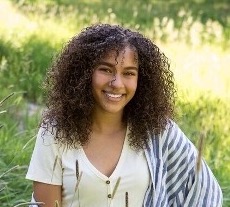
Rae Stokes
Artist of Normal People and We Are Still Fighting for You
Hi all! My name is Rae Stokes and I am a current Undergraduate third year at Columbia University double majoring in Human Rights and Ethnicity and Race Studies. Growing up biracial, I was forced to learn that America is not truly the ‘land of the free’ it markets itself as. I exist as a taboo, as proof that the world of white and Black still remains divided. As a light skin Black woman that grew up in a wealthy white suburb, I benefited from privilege, but I also saw the same neighborhood, school system, and people that treated me well, treating me as an invader, unworthy of being there. It took years of therapy for me to realize that the environment I grew up in taught me to hate the Black side of me. In order to understand my struggle with race, I turned to art.
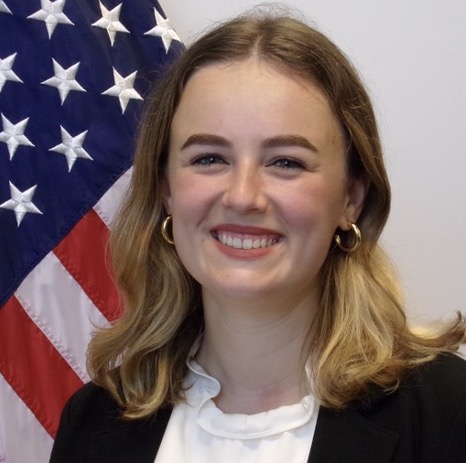
Callie Whelan
Artist of Land of the Bought and Modernity Has Failed Us
Callie Whelan is a junior Glynn Family Honors Scholar at the University of Notre Dame majoring in Economics with minors in Computing & Digital Technologies and Collaborative Innovation. On campus, Whelan works as a Research Assistant in the Kellogg Institute for International Studies and as a sworn Digital Forensic Investigator in the St. Joseph County Cyber Crimes Unit. She is passionate about the intersections of design, justice, and technology.
HDC Team
Chairs
Maria Teel - Conference Co-chair
Maria is a senior studying Political Science, French, and International Development Studies. On campus, she conducts education research in the International Education Research Lab and supports development projects as a program assistant at the Pulte Institute for Global Development. She also has experience in social entrepreneurship and entrepreneurship consulting through internships with the Mandela Washington Fellowship for Young African Leaders, the South Bend Entrepreneurship and Adversity Program, and Sustain Micro Enterprise. This summer, she conducted independent research on language and education in Senegal. She was the co-chair of the Abstracts Committee for HDC 2021 and is looking forward to creating an engaging and educational conference for HDC 2022!
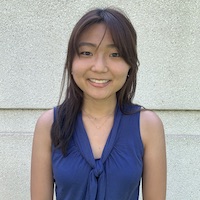
Stella Eunseo Cho - Conference Co-chair
Stella is a senior and Stamps Scholar majoring in Neuroscience and Spanish, with a minor in the Glynn Family Honors Program. As a first-year student, she received the Kellogg Institute's Experiencing the World Fellowship to volunteer at a public health clinic in Patzún, Guatemala for two months while staying with a local host family. Growing from this experience, she became avidly involved on the HDC team, with specific interests in global public health. On campus, she is also involved in the Notre Dame Folk Choir, Asian American Association leadership board, and undergraduate research for Dr. Cody Smith's zebrafish lab. Outside of campus, she dedicates herself to volunteering at the local Elkhart General Hospital and Cardinal Nursing Home. In her free time, she enjoys writing music, reading, trying new foods, traveling, and spending quality time with friends! She is so excited to help create an amazing HDC 2022 experience and is looking forward to working with all of you!
Liaisons
Liaisons Co-chair: Hannah Reynolds
Hannah is a junior from Rumson, New Jersey, majoring in Economics and Global Affairs with a concentration in International Development. She is interested in economic development, especially for women and how education plays a role in this development. This past year she has had multiple experiences with female economic empowerment through a winter term VSLA project in Jinja, Uganda and her ISSLP which worked with female farmers in Banjul, The Gambia. In addition, she works with the Pulte Institute for Global Development on the Strong Beginnings: Developing the Whole Child in Haiti project. Outside of the classroom she loves reading, baking with friends, and competing for Notre Dame’s triathlon team. Hannah is excited to join the HDC team and is looking forward to a great conference this spring.
Liaisons Co-chair: Maura Hogaboom
Maura Hogaboom is a junior at Notre Dame from Arlington Heights, Illinois studying Economics and Pre-Health with a minor in Poverty Studies. She is also a member of the Glynn Family Honors Program. This summer, Maura took part in the International Summer Service Program and remotely interned with Child Family Health International in Bolivia, learning about and researching adolescent pregnancy and mental health care in Bolivian populations. Previously, Maura has been involved in public health work in Chicago’s underserved communities with Esperanza Health Centers, but she is excited to learn more about healthcare in a global context as a part of HDC 2022 and throughout the rest of her education. Additionally, Maura spends time volunteering with La Casa de Amistad in her favorite city of South Bend and loves serving the Notre Dame community as a part of the Social Concerns and Sustainability departments of student government.
Logistics
Logistics Co-chair: Ana Tisa
Ana Tisa is a senior from Jacksonville, Florida majoring in Psychology and Global Affairs, with a concentration in Peace Studies and a minor in Social Entrepreneurship. Her interest in women's and children's empowerment – especially in response to gender-based violence – has grown since working at a domestic violence center this summer where she trained as an advocate and worked in fundraising, direct services, and community education. This summer she also interned for the YALI program through the Pulte Institute for Global Development where she communicated with and learned from social entrepreneurs across Africa. Her classes and experiences with empowering people through viable work inspire her capstone and current work at an impact investing fund. Ana is happy to be a part of the HDC team again and is looking forward to an in-person conference!
Logistics Co-chair: Madeline Soiney
Madeline Soiney is a senior from New Berlin, WI majoring in Spanish and Global Affairs, with a concentration in Global Policy and a minor in Latino Studies. She is particularly interested in foreign policy related to Latin America, migration, and human rights. Since December 2020, Madeline has worked with Professor Aníbal Pérez-Liñán at the Notre Dame Reparations Design and Compliance Lab, co-authoring a paper analyzing the impact of domestic institutional reforms on Paraguay's compliance with international human rights law. This summer, she interned with the U.S. Department of State in the Bureau of Western Hemisphere Affairs, Office of Andean Affairs, primarily working on U.S. foreign policy regarding Peru, Bolivia and Ecuador. In her senior thesis project, Madeline is investigating the role that language has played in the Dominican Republic's denial of citizenship to Haitian migrants and their descendants. She is greatly looking forward to facilitating the planning and execution of this year's Human Development Conference!
Marketing
Marketing Co-chair: Mariah Horvath
Mariah Horvath is a senior from Denver, CO studying Neuroscience and Behavior, with a minor in International Development Studies. On campus, Mariah works as a teaching assistant for International Development in Practice, a course centered around student advisory teams partnered with international organizations. Mariah is also involved with student government as the Vice President for the Class of 2022 and works with the Alumni Association Support Team. Currently, Mariah is working on completing her own capstone research project and is very excited to be involved with the Human Development Conference as a Marketing Co-Chair.
Marketing Co-chair: Ryan Murdock
Ryan Murdock is a junior studying Applied and Computational Mathematics and Statistics (ACMS) and Global Affairs with a concentration in International Development Studies. He grew up just North of Chicago but comes from a large family of Notre Dame Alumni, so South Bend was always a second home growing up. He is particularly interested in using his experience in ACMS to analyze developmental progress in a research project that he will conduct through the Kellogg Institute next summer. This past summer, Ryan interned at the McKenna Center for Human Development and Global Business’ South Bend Entrepreneurship and Adversity Program where he was a consultant for local entrepreneurs seeking to grow sustainable businesses from adverse economic circumstances. He is very excited to use the experience he gained in marketing to work with the Human Development Conference for the first time this year!
Abstracts
Abstracts Co-chair: Matt Heilman
Matt Heilman is a junior studying Neuroscience & Behavior and Gender Studies, with a minor in Computing and Digital Technologies. He comes from Carmel, IN, so the chaotic Midwestern weather of South Bend is not too out of the ordinary for him. On campus, he works as an undergraduate research assistant in the BRAVE Lab with Dr. Laura Miller-Graff, and also as a visitor services associate at the Snite Museum of Art. Additionally, he is a member of the University of Notre Dame Folk Choir and a GRC Firestarter, and he is very involved with Student Government. Over the summer of 2020, he interned virtually at Badgers Academy in Cape Town, South Africa as a part of the Kellogg Institute's first ever batch of virtual interns, and he has stayed involved with the institute and its programming ever since. He cannot wait to serve as one of the Abstracts committee co-chairs this upcoming year!
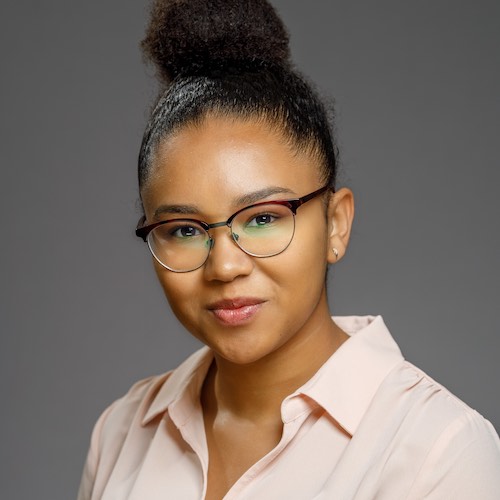
Abstracts Co-chair: Diana Spencer
Diana is a senior from Dakar, Senegal majoring in Economics, Global Affairs, and Gender Studies. She is also part of the Glynn Family Honors Program and the Merit Scholars Program. With a concentration in International Development Studies, Diana’s research interests lie in the economic empowerment of women in developing countries. In 2020, she conducted a research project in Senegal to measure the influence of conventional microfinance and Islamic microfinance on the living conditions of women entrepreneurs. Diana is also interested in entrepreneurship and has had various international experiences in that field. Over the last two years, she worked with Ashoka in Brazil and interned virtually with Social Entrepreneur Corps (SEC) in Guatemala. On campus, Diana is involved with the Kellogg Institute, the International Student Advisory Board, and the African Student Association. Outside of class, Diana enjoys baking and photography.
Mixed Media Contest
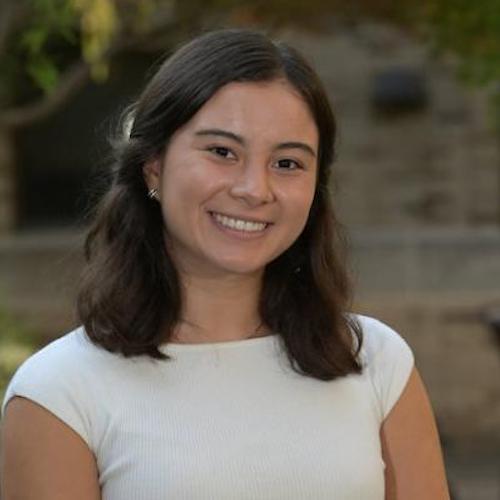
Mixed Media Contest Chair: Anna Kulczycka
Anna is a sophomore from Birmingham, Alabama studying Business Analytics and Visual Communications Design. She is a part of the Kellogg International Scholars Program and performs research under Professor Julia Kowalski, surrounding the difference between the terms “politics” and “social welfare.” She hopes to research abroad soon and work to learn more about her family’s Polish and Mexican heritage. She works on campus as a part of Strike Magazine and to grow her sustainable fashion project on Poshmark. This past summer she interned with several companies, including a fashion company she creatively directed a photoshoot for. She is so excited to bring her love for photography into being involved with HDC!
Graphic Design
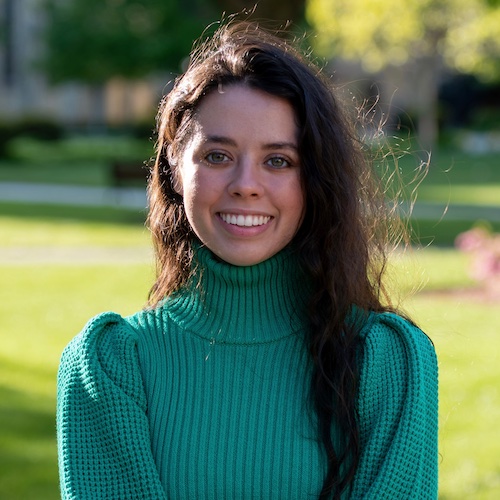
Graphic Designer: Madison Wagner
Madison is a junior from Strongsville, Ohio, studying Management Consulting with minors in Data Science and Collaborative Innovation. She is interested in pursuing a career in marketing, specifically in brand management, and she serves as the marketing director of Strike Magazine as well as a research assistant for the marketing department at the Mendoza College of Business. Madison started her own graphic and website business, where she works with small businesses to create brand identities and other marketing materials. Madison is also the Chief Operating Officer of SIBC, a member of the Welcome Weekend Steering Committee, and recently interned with Sarah Flint. Inc as a Brand Ambassador Intern.
Call for Mixed Media
We are excited to announce the Call for Mixed Media for the 2022 Human Development Conference (HDC)! This year’s conference will be held in hybrid format on February 25-26, 2022 under the theme “Our Global Responsibility: Seeking Inclusive Growth Amidst Widening Inequality.” Through the Mixed Media Contest, undergraduate students have the opportunity to engage creatively with human development themes through media.
We believe that visual media not only prompts conversation and storytelling but also contributes a human lens to complex issues of development.
We invite students to submit media to be displayed both in-person and in a virtual format during the conference. All accepted submissions will be published for viewing on the Human Development Conference website. Select photos may be printed and displayed in the Hesburgh Center for International Studies at the University of Notre Dame, as well. The HDC Mixed Media Committee will review and select finalists to display their work.
Mixed Media Requirements: To have a photo or video be considered as a display at the 2022 HDC, you may submit up to 2 pieces total. Media can include photos, videos, paintings, drawings, ceramics, sculpture, posters, collages, or another form of media. Media should be relevant to the conference theme or human development more broadly. For each piece please include:
- Title
- Location of media
- Approximate date of media
- A paragraph-long description of the work. We want to hear about the people, the place, and how creating the piece of media affected your understanding of human development.
Please keep the following considerations in mind when submitting media:
- All submissions MUST have been created by the individual submitting the piece.
- Whether the people in the photo or video would want to see their likeness displayed as it is in the piece of media. Photos or videos of children or individuals who were not able to consent to have their photo taken should not be submitted.
- Consider media carefully and ensure that you do not submit a piece of media that might negatively impact a person’s safety or reputation.
All media must be submitted by January 24, 2022, at 11:59 pm EDT. To submit a piece, please click here.
For additional information, please email hdc@nd.edu questions or concerns. We look forward to receiving your submissions!
Call for Papers
The Ford Program in Human Development Studies and Solidarity and the Kellogg Institute for International Studies, part of the Keough School of Global Affairs at the University of Notre Dame, announce the 14th annual Human Development Conference.
For fourteen years, the Human Development Conference has provided a forum for undergraduate students from a wide range of backgrounds and disciplines who are passionate about development to engage in dialogue about development research.
We are excited to announce the Call for Papers for the 2022 Human Development Conference (HDC). This year’s conference will be held between February 25-26, 2022 under the theme Our Global Responsibility: Seeking Inclusive Growth Amidst Widening Inequality. We hope to invite students from the tri-campus community (Notre Dame, Holy Cross College, and Saint Mary's College) and other universities to present their research. To comply with Notre Dame’s safety restrictions due to the COVID-19 pandemic and to increase accessibility to the conference, we anticipate offering both virtual and in-person presentation options. Students are able to indicate their preference on the application form.
The conference provides an excellent opportunity for undergraduate students to display their development-related research and engage with other students, faculty, and professionals as they explore human development themes. Building off of last year’s conference theme, The Future is Now: Innovative Responses to Global Adversity, the 2022 conference seeks to shed light on the continued need for interdisciplinary innovation and our responsibility as global citizens for collaboration during these times of widespread disparity.
Conference participants will be encouraged to highlight the need for inclusive, person-centered approaches toward human development and will be chosen to share global research from their time as an undergraduate student on topics such as:
|
|
|
To apply to present at the 2022 HDC, please submit a 250-word abstract (short summary) of your research. The HDC is open to presentations on research conducted both virtually or in-person. Guidelines and tips for writing abstracts are available on the HDC website. All abstracts must be submitted by Friday, November 19, 2021, at 11:59 PM EDT. To submit an abstract, please click here.
We hope that you will consider joining us by submitting an abstract!
Abstract Guidelines
A good abstract that will be considered for the 2022 Human Development Conference does each of the following:
- Briefly introduces the reader to the topic by providing relevant background information on global research performed in-person or virtually
- Clearly expresses the research question that was asked
- Provides concrete details about the methodology used (including where the study was conducted, how many participants were involved, recruitment method, and type of data analysis)
- Presents research findings that answer the proposed question
Abstracts must be no more than 250 words long. Sample abstracts that have been accepted to previous Human Development Conferences are provided below:
Sample Abstract 1
Sub-saharan Africa currently bears 24% of the global disease burden, yet is home to just 3% of the global health workforce (Anyangwe 2007). Despite this crippling disease burden, nearly 45% of graduating physicians in Uganda plan to emigrate upon graduation (Kizito 2015). Medical brain drain refers to this human resource crisis that plagues the healthcare systems of many developing countries, where newly graduated physicians choose to leave the country after receiving their formal medical education. For over a decade, public health leaders have attempted to meet this critical human resource shortage through an increase in the availability and efficacy of medical education (Akuffo 2014). Through in-depth interviews with over 40 medical students at Makerere University in Kampala, Uganda, my research attempts to uncover the complex push and pull factors that affect the emigration decisions of Ugandan medical students. While past research points to low pay and high overburden on health professionals as the impetus of the brain drain, my project identifies sociocultural factors that influence emigration like social ties, national pride and shame, socioeconomic background, as well as lived experience in the health system. These results provide tangible recommendations for public sector managers and policy makers in Uganda to help curb brain drain in their health system.
Sample Abstract 2
Although the Ministry of Health recommends yearly cervical screening through Pap tests, Nicaragua has one of the highest cervical cancer mortality rates in Latin America due to pervasive barriers that women face in accessing healthcare. One aim of this study was to explore strategies to mitigate these barriers in culturally appropriate and feasible ways, including primary prevention and secondary prevention through Human Papillomavirus (HPV) self-collection. HPV self-collection is an innovative and empirically based strategy shown to increase cervical cancer screening for women in lower resourced settings. Utilizing a collection brush, women can collect their sample in a setting of their choice and send the sample to get tested. We partnered with the Ministry of Health, a local human rights NGO and interprofessional collaboration in Bluefields (the largest city on the Caribbean Coast) to conduct a community-based needs assessment, key informant interviews (n=12), focus groups (n=25) and a systematic environmental scan, all guided by the socio-ecological model. We audio-recorded and transcribed verbatim all data. We analyzed descriptive statistics and through thematic analysis, we analysed qualitative data. According to our findings, the main barriers were: cultural obstacles, machismo being the main issue, misconceptions about prevention, and a lack of systematic and comprehensive sexual health education. If rolled-out under specific circumstances, HPV self-collection could increase access to cervical cancer screening for women in Bluefields and the surrounding rural areas by overcoming these barriers, thus empowering women to take agency over their health. More research is needed to pilot this intervention.
Sample Abstract 3
Dubbed as the worst country to be disabled by the British Broadcasting Corporation, 95% of people in Ghana have no access to rehabilitative services (Tinney 11-12). Without a systemic chronic disease policy, organizations and researchers have paid little attention to study amputees and invest in rehabilitative care despite their unprecedented growth. Although there are clear financial, logistical, and social barriers to receiving care, it is unclear what factors impact an amputee’s decision to be treated or whether a prosthesis is desired in the first place. The study aims to research the ability, choice, and desire to pursue prosthetic services from the viewpoint of amputees. Between July and August 2016, data was collected through 24 interviews with healthcare providers, amputees, and prosthesis-users in the Cape Coast and Accra region. Ethnographic research methods were used to analyzed key distribution and health facilities which found that (1) rehabilitative facilities in Ghana for prost
Bartell Prize
The Rev. Ernest J. Bartell, CSC, Prize for Undergraduate Research on Poverty and Development is conferred annually at the University of Notre Dame's Human Development Conference. Two $1,000 prizes recognize outstanding undergraduate student research on poverty and development. Each year one prize will be given to a student at the University of Notre Dame and one to a student from another university.
Undergraduate students invited to present at the 2022 Human Development Conference are eligible to apply for this award. Information regarding how to apply is included in the conference invitation. Students who wish to be considered must apply by Monday, January 10, 2022. Additional information and/or an interview may be required. Finalists will be notified in the beginning of February.
Student research should address a specific aspect of poverty and development, whether in the United States or abroad. Research may be submitted from any field of study, including the social sciences, natural sciences, and humanities. Students are encouraged to conduct original research and to consider programs and policies that could help reduce poverty. A faculty committee will determine the award recipients, and prizes will be conferred during the Human Development Conference, February 25-26, 2022.
Past Conferences
2021
The Future is Now: Innovative Responses to Global Adversity
February 26-27, 2021
Global development and collaboration cannot be halted due to COVID-19 or any other global adversity. The ways we approach integral human development must be adaptable to our ever-changing global environment. Oftentimes, new solutions are driven by unavoidable barriers and unexpected set-backs, and impressive innovations arise from times of crisis. In the midst of the COVID-19 pandemic, creative adaptability is key to persevering in the mission of integral human development, which is to foster conditions conducive to flourishing for every individual and every community. So far, we have seen a contagious energy as new methods of communication and collaboration inspire hope for the achievement of this mission. In a time with added fear and uncertainty, social connectedness is truly the only way forward. From the bottom up, integral human development must be fueled by a commitment to social connectedness through inclusive discourse and collaborative innovation.
2020
Development on the Move: Global Strategies Informed by Local Contexts
February 21-22, 2020
Development on the Move not only addresses the need to understand and address issues from a global perspective but also calls each of us to action. This conference will emphasize shifts in both personal and collective action, focus on developing expertise in global issues, and spark conversations that lead to change.
2019
Engaging with Empathy: A Preferential Option for the Poor in Development
February 22-23, 2019
In order to ensure that past historic injustices are not repeated and to promote the human dignity of all individuals, it is necessary to engage with empathy and to view research, problems, and policies from the perspective of those most affected by development challenges.
2018
Decades of Development: Contextualizing the Past, Envisioning the Future
February 23-24, 2018
Human-centered approaches to development requires trust, compassion, and awareness in order to place the individual at the center of development.
2017
Development with Dignity: A Human-Centered Approach to Progress
February 24–25, 2017
In order to implement the Sustainable Development Goals, the global community needs to shift from theory to practice – from policy to individuals – refocusing its efforts by placing humans at the center of the sustainable development agenda. Creating solutions to critical issues that afflict the world’s populations today requires not only a shift in scale but the recognition and continual affirmation that the dignity of peoples on all sides of the path to progress must be the central focus of development.
2016
Re-Imagining Development: Pursuing Good in a Changing World
February 26–27, 2016
The conference focused on the transformative power of new ideas: how development paradigms that emphasize agency, inclusivity, and dignity can redefine success and challenge traditional methods in development. As the new Sustainable Development Goals illustrated, this evolution in development calls upon countries and citizens in both the developing and developed worlds to work together to overcome our shared challenges and ensure our interconnected prosperity.
2015
Envision, Enact, Evaluate: Sustaining Momentum in Development
February 27-28, 2015
2014
Transforming Development: New Actors, Innovative Technologies & Emerging Trends
February 28 – March 1, 2014
The theme of the sixth annual Human Development Conference, "Transforming Development: New Actors, Innovative Technologies & Emerging Trends," was inspired by the idea that development is an evolving process. A widening set of stakeholders and rapidly advancing technologies raise new possibilities for the field. The conference was a chance to reflect on both successes and failures in development, while analyzing opportunities created by these new trends.
2013
In the Field: Cultivating Collaboration and Innovation
February 8-9, 2013
The fifth annual Human Development Conference, “In the Field: Cultivating Collaboration and Innovation,” brought together more than 200 students, faculty members, and development experts from around the world, including keynote address speaker, Sara Sievers, the founding executive director of the Center for Globalization and Development at Columbia University’s Earth Institute. Over 70 students presented their own research, representing fieldwork from more than 30 countries. Topics addressed ranged from evaluating the perceptions of trust among Peruvian sexually abused victims to combating cancer in Samoa and implementing organic agricultural certification in India.
2012
Faces Behind the Figures: Visions of Prosperity, Progress, and Human Potential
February 10-11, 2012
The fourth annual HDC, “Faces Behind the Figures: Visions of Prosperity, Progress and Human Potential,” took place during February 2012, culminating in a keynote address given by Not For Sale’s co-founder and executive director Mark Wexler. The conference featured 250 students, faculty and development experts from across the United States and beyond. Eighty-two students presented research on development-related topics conducted in over 35 different countries. Panels addressed topics ranging from food security and agricultural development to post-conflict transformation and the effectiveness of foreign aid.
2011
Unleashing Human Potential: Global Citizens in Pursuit of the Common Good
February 11-12, 2011
The third annual Human Development Conference, “Unleashing Human Potential: Global Citizens in Pursuit of the Common Good,” brought together 73 undergraduate and graduate student-presenters with research experiences in over 30 countries. The Ford Program also welcomed a group of two students and three faculty members from Uganda Martyrs University, the program’s partner university in on-site research and development projects. The two-day conference concluded with a dinner banquet and keynote address given by microfinance specialist David Roodman from the Center for Global Development.
2010
People, Power, and Pragmatism: The Future of Development in Our Changing World
February 26-27, 2010
The second annual Human Development Conference, “People, Power, and Pragmatism: The Future of Development in Our Changing World,” was held in February of 2010. More than doubling in size from the previous year, the conference grew to 80 students with research experiences in 38 different countries. Thirty-eight colleges and universities from across the globe were represented. Ray Chambers, the United Nations Secretary-General’s Special Envoy for Malaria, spoke on his commitment to the Millennium Promise and Malaria No More. The keynote address was delivered by Joseph Sebarenzi, the former speaker of the Rwandan Parliament, who spoke passionately about his experience as a genocide survivor and his efforts to create reconciliation, peace and development in Rwanda and the world.
2008
Innovation in the Service of Human Dignity: A Human Development Conference
November 7-8, 2008
In November of 2008, the symposium grew into a full conference sponsored by the Ford program and co-sponsored by the Center for Social Concerns and the School for International Training. The program's first annual undergraduate research conference, “Innovation in the Service of Human Dignity” featured graduate and undergraduate student presenters from 29 universities and representing 28 countries of research. The conference drew more than 250 participants, and moderators from around the country also attended the conference to facilitate panel discussions. Peter McPherson, the former head of USAID, delivered the keynote address.
Solidarity in Pursuit of Authentic Human Development
Saturday, February 23, 2008
In 2008, together with the Center for Social Concerns, the Ford Program sponsored a student research symposium entitled “Solidarity in Pursuit of Authentic Human Development.” Twenty-eight students presented at the event, including students from Uganda Martyrs University. Raymond Offenheiser, president of Oxfam America, delivered the keynote address.






